Text
Including New Players
By Steven Medway
There is no one thing that you need to do as a Storyteller to include new players and make sure that they have a good time (and come back for more!). Having said that, here are a bunch of tips and tricks that I've found to work especially well.
Read out the rules explanation sheet
New players only need to know a few basic things to begin playing. The rules explanation sheet explains these things, and nothing more. I've gone into detail as to why this works in a previous post:
https://bloodontheclocktower.tumblr.com/post/720003279420030976/explaining-the-rules-to-new-players
Repeat rule #1 – "You may say whatever you want at any time" – at least once during the first game.
The thing that new players need most is to feel comfortable. They need this more than strategy advice and more than rules knowledge. If veteran players are telling new players what they should and shouldn’t say, then a new player might feel like it is better to stay silent. Or, if veteran players are policing or judging the speech of other veteran players while in earshot of a new player, the new player may get the impression that they best stay silent, at least until they become a veteran too. Reminding the group that each player may say "whatever they want at any time" smooths out this dynamic and encourages new players to speak up without fear.
The point where this is most needed is when a new player has been silent for most of the game and is then nominated. Often, they will be hesitant to speak, and a veteran player will advise them what to share or not share, depending on what character they are. While this may (or may not!) be good strategy, this creates a default of silence for a new player when instead we want them to have fun and engage. If this happens, I usually say to the new player "You may take player X's advice and stay silent if you wish. However, player X may be evil and lying to you. It can be helpful to reveal what you know, but the choice is up to you. The number one rule of the game is that you may say whatever you want at any time."
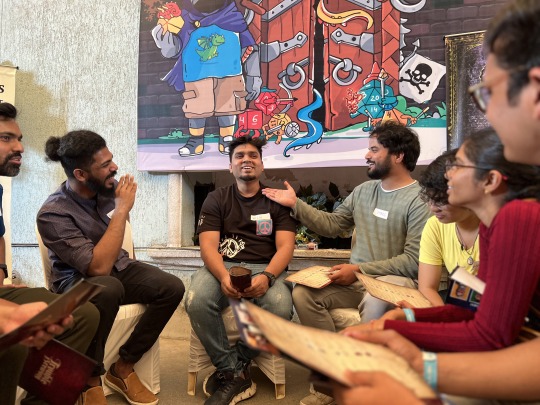
If a player is generally a quiet person, never force them to talk
Clocktower is a social game, and the good team relies on sharing information in order to win. The game also relies on people talking when and how they wish, and staying silent if they are unsure. Players that are shy or nervous will feel very uncomfortable if the players (or, heaven forbid, the storyteller) puts them in a position where they feel that they must speak. Players want to contribute, otherwise they wouldn't be playing in the first place. But forcing certain players to speak when the whole group is looking at them can often be intimidating and uncomfortable.
However, this courtesy doesn't extend to preventing them from dying, or encouraging players not to kill them. Shy players don't get special treatment when it comes to the vote. They still live or die based on the will of the group.
If a player wants to talk (particularly if they have just been nominated) but is finding it difficult, ask them, "What do you wish to say?"
Some players are extremely sensitive to being interrupted. In a group of ten, fifteen, or more players, there is no shortage of players that want to speak while someone else is speaking. Most players, when nominated, will talk in their own defence, and continue to talk even if another player tries to interrupt. However, some players will stop talking at even the slightest comment and find that they cannot finish a sentence.
If I ask a particularly silent player, "Do you wish to speak?" or "Do you have anything to say?" when they are nominated, the answer has been "no" almost 100% of the time. Either they feel like they are taking up the group's time unnecessarily, or they don't handle interruptions well, or something else.
When I asked the question "Do you wish to speak?", framing it as a closed, yes/no question, players found it easier to answer "no".
However, if I ask such a player an open ended question such as;
"What do you wish to say?"
"You have been nominated. What do you have to say for yourself?"
"Player X has nominated you. What do you think about that?"
or otherwise prompt the new player to speak, they start speaking and usually have a lot to offer. This is often the first point in the game that the player really opens up and starts to have fun. Once they've done that once or twice, you won't need to ask the question again.
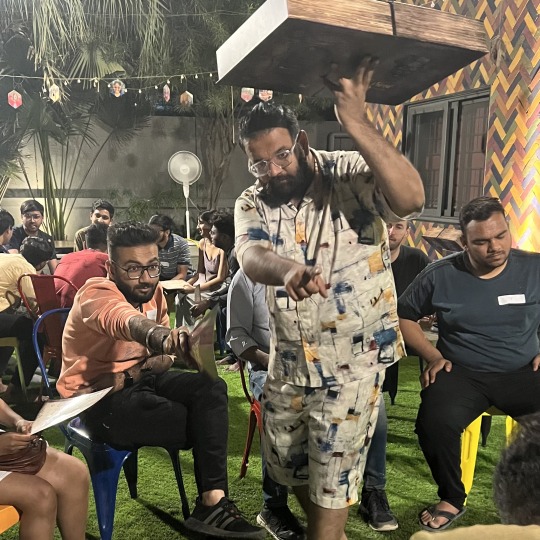
If you have one or two new players in a group of veterans, offer to bring in the Angel
Most new players have two fears when joining Clocktower for the first time: fear of saying the wrong thing and fear of dying. The first is social fear. The second is a game-strategy fear. Both are connected to the fear of losing or letting their team down.
Sometimes new players don't have any fear at all and just want to play the game for as long as possible, so they see an early death as a waste of their first game.
To overcome these things, the Angel will keep a good player alive until you, the Storyteller decide that it's time for that protection to end. The player doesn't need to worry about the Demon killing them too early, doesn't need to worry about not getting to use their ability, and doesn't need to worry about ‘letting their team down’ by dying early. Veteran players and storytellers know that this last worry is unfounded because dying early is not a big deal, and sometimes even desirable, but new players may not know that yet.
It's important for the player to know that the Angel isn't a handicap – it’s just part of the game! They are not imbalancing the game by accepting the Angel protection. Players are still free to execute them, and the Angel-protected players may still be good or evil. It mostly means that the Demon must turn their attention to different players at night, or pay the price.
If you can pitch the Angel not as a necessity and not as a handicap but as a cool opportunity that makes the game a little more interesting for everyone, and always allow the new player to choose not to have the Angel, you're doing great.
https://wiki.bloodontheclocktower.com/Angel
If you have one or two veterans in a group of new players, offer to bring in the Buddhist
Often, enthusiastic veterans want to tell new players how to play. They share too many rules, too many pieces of strategy advice, and generally make logical leaps much faster than new players.
New players will often feel like the veterans are telling them what they should do. Even if veteran players just tell them what they "can" do, it often feels like being told what they "should" do. This can be a domineering thing, or it can be the nicest thing in the world. It is usually the latter. Most times I give the Buddhist to a veteran, that veteran is one of my favourite players. It's just the case that, most of the time, new players have more fun when they figure things out for themselves. It prevents overwhelm and just feels more rewarding.
Similarly, veteran players are usually the first players to speak each day. They have their plans and ideas already, formed during the night, and leap into action as soon as the day begins. Even the most polite and considerate veterans tend to take the lead early each day - because that is a winning strategy! However, this creates a habit in new players of becoming followers, and waiting to see what the veteran players say each day before speaking themselves. The Buddhist breaks this habit before it begins. With the Buddhist in play, I've seen totally new players take the lead and start conversations each day, forming good habits of leadership and teamwork early.
It is best to bring in the Buddhist at the beginning of the game, not during the game. If the Buddhist comes in midway through the game it can feel like a punishment for the veteran player, which it is not. Also, a mid-game Buddhist is usually coming in because the new players have not formed the habit of talking early each day, so the habit of silence and waiting for others to take the lead is already half-formed.
When the Buddhist is in play from the very beginning, new players are practically playing with all new players from the very first day, and will be happily chatting away with each other by day three or four, and working as a team. Most Buddhist games I run, I put the Buddhist in day one, and I remove it by day three, at which point, the new players and the veteran players are all chatting at about the same amount, and I never need it again.
While being a Buddhist is always a choice for a veteran, I present it as less of a choice than the Angel. For the Angel, I ask a new player, "The Angel is here to help you have a good time for your first game. I think it's really cool, but it's up to you. Do you want it or not?" For the Buddhist, I ask a veteran, "I'd really like to bring in the Buddhist for this game, so that the new players can find their feet by themselves. Is that ok?" If a player really doesn't want the Buddhist, that's okay. But I ask them for the good of the game and hope that they will be cool with it. After a day or two I'll even reduce the Buddhist time to just the one minute, as long as the new players are engaged.
https://wiki.bloodontheclocktower.com/Buddhist
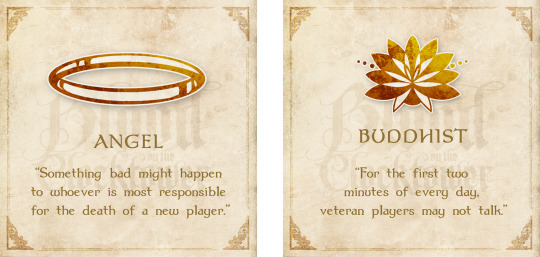
Think skill level before edition
New players are at their best, have the most fun, and learn quickest when they are in games with other new players. They figure out the rules when they need the rules, and they figure out the strategies by testing them out together.
The choice of edition isn’t as important as you might think. I’ve had almost completely new players play and love Bad Moon Rising, Sects & Violets, The Tomb (Called The Seventh Day at the time) and even Garden Of Sin. The Grimoire setup shouldn’t be mean if using these editions, but it is ok to run these editions if your players are newish and keen for a challenge. The important thing is that they experience them (or their similar custom scripts) in an environment where most other players are the same skill level, because they learn the edition together.
Conversely, I’ve seen new players really flounder when playing Trouble Brewing with veterans. Even the most intelligent new players are unfamiliar with the characters and interactions when compared to the veterans, so they are often playing the game of ‘catchup’ or the game of ‘help me understand’ instead of the ‘let’s figure this out together’ game. It mostly comes down to speed of understanding, not depth. The new players just can’t keep up with Trouble Brewing veterans, who no longer need the character sheet.
If you have a new player in your group, you don’t have to play Trouble Brewing just to cater to them. Given the large player size and need for social spaces, almost all Clocktower events have at least one new player. If you always play Trouble Brewing if it is a new player’s first day, then you’ll never play anything else. It’s not exactly easier for a new player to join in an intermediate or custom script for their first game either. But the social environment is more important than the edition.
If your group is large enough, running a Trouble Brewing game for beginners (and only the beginners), while the veterans play the more advanced editions is ideal. At pub events we often do this, and some players will swap from one group to the other as the night progresses. This works well but has the downside that you need at least 16 people to pull it off – 7 players and 1 Storyteller per game, with 2 games running at once.
Keep the games small
New players have a lot to think about, all at once:
What the game rules are
What each character ability does.
What possible characters could be in play.
What their strategy should be.
Whether their questions to the group are being answered truthfully or not
If player X is telling the truth, and player Y is lying, what does that say about player Z?
The easiest way to make it easy on your new players is to keep the games small, so that they only need to focus on a few people and a few characters at once. This makes the logic of the game significantly less complicated. More characters make things exponentially more complicated. With fewer characters in play, new players can focus on fewer character interactions, and don’t have to worry about understanding everything all at once.
You don’t need to go all the way to Teensyville. Just keeping the game to 7, 8, or 9 players is great. This should give a tight enough focus for a new player to really get to grips with what is happening, and what each player’s claims mean in context. Also, with 7, 8, or 9 players there is only one Minion, which helps provide clarity as to what isn’t in the game.
In smaller games, new players are talking to the same players over and over again and building up a picture of the whole game. This isn’t possible for a new player in a 20-player game, because there is too much to comprehend at once.
Keep the games short
A new player needs to be able to make mistakes that don’t have a lasting impact on their fun. When the games are short, even the most egregious errors can quickly be washed away. Did your first timer just claim to be the Demon, under pressure, and then get executed? No problem, in a short game. If they did it in a 17-player game with a Scarlet Woman and a Zombuul, they will be sitting there for a long time with nothing to do, feeling foolish.
The length of your days should be tailored to the player count, but also to new players and their need to experiment, make mistakes, and make risky plays. New players also may want to stay silent until the final day or the right moment, and it is helpful if you can speed up your days so that this moment comes more quickly.
Some players like long, serious games, but these players also usually like a more thoughtful, planned, strategy. New players are figuring things out as they go. Have you ever played a 6-hour Eurogame and at the 2-hour mark realised that you made a mistake on your first turn? And now you have to sit there for four hours, knowing that you’ve already lost, and are just going through the motions to be polite? That’s no fun at all, and I want to avoid a similar experience for new players at all costs. I’ve seen more than one video, review, or piece of feedback that said “BOTC sucks. I died on the first day, and had to sit there for nearly 3 hours doing nothing because I couldn’t leave.” 7 or 8-player games can be run in 45 minutes, and a 9 or 10-player game can be run in one hour. Games should only go for more than an hour and a half if all players want it to, and it is difficult to tell if new players want it to.
Shorter games also mean more games, and new players get to try out more ideas and more characters. Having many quick games also creates a more frivolous and playful mood. That mood is much more conducive to fun, learning, risk-taking, and experimenting with just-learned rules knowledge than a 2-hour epic game is.
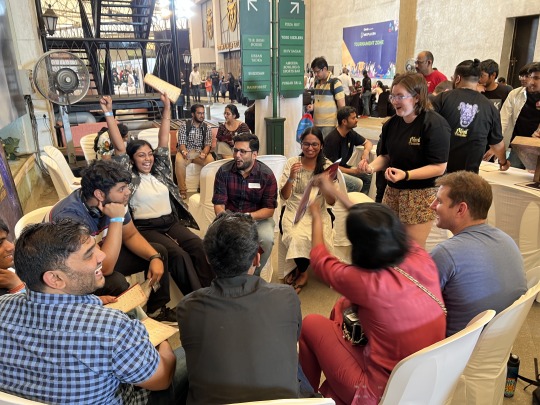
Use humour, be approachable
A new player may not know anybody in the group. They may not even know you, initially. But you are the centre point for attention, and the only person who is guaranteed to be interacting with them in some way in every game.
You are also the only person that a new player can trust. Other players may be lying to them, but the Storyteller’s role is to be a trusted helper to new players. Rule #3 – “Ask me any questions you need to” – is there to remind new players that you are there to help! When I read the rules, I emphasise that no question is a silly question, and that it does not make you evil to ask me a question.
The more you use humour, positivity, liveliness, understanding, and playfulness in your approach to storytelling, the more that new players will feel comfortable to speak, listen, and think naturally. If they are having a good time due to your vibe, they will learn faster and integrate into the group quicker. And if they don’t integrate, that’s okay too, as long as they are having fun.
New players are more important than veterans
New players need your help more than veteran players do. They need to learn the rules. They need to know the basics of basic strategy. They need to know what the tone and feel of the game is, because that implies a certain etiquette. They need to know what the character sheet means, or what night signals mean. They may need to know which players are the friendliest, or where the bathroom is.
Veteran players don’t need as much help. Apart from the occasional weird rules question, they can take care of themselves.
Let them play
It is easy to unintentionally be overbearing with new players. Fight the urge to tell them what to do, or to help too much, because doing so can easily feel smothering to them.
Let new players make mistakes. Let them be silent if they want. Let them learn at their own pace. Let them poison the Saint twice in a row, or kill a dead player. Let them not know about that wacky character’s special ability, until they ask.
Find the balance between helping and watching. Being too involved can be irritating. Being just the right amount of involved can be wonderful.
- Steven
20 notes
·
View notes
Text
Explaining the Rules to New Players
By Steven Medway
When explaining the rules to new players, stick closely to the rules explanation sheet https://wiki.bloodontheclocktower.com/Rules_Explanation
The rules explanation sheet takes no more than 5 minutes to read, and it is intentionally structured as a three-step process:
1) The Theme
2) The Goal
3) The Rules
The Theme
I have found that the best way to learn the rules of a board game is to start with the theme of the game. This gets players interested in what is about to come, sets the tone, and puts everything that you are about to say into perspective. If players are on board with playing a secretive backstabbing vampire game, they need to know in the first minute what they are getting into and why it is going to be fun. Similarly, if players are not wanting to play a stock-trading game set in the 1800s where we are each competing to own the most attractive investment portfolio, then they will get interested or disinterested at that point. First of all, players want to know "What on earth is this about?" and "Why is this going to be fun?". Explaining the game's theme also sets the stage for who are likely to be the good guys, the bad guys, and the rough expectations of the game's ‘plot’.
The Goal
After players know what a game is roughly about, the next best thing to explain is the goal. Before any rules are mentioned, in any game I run, I explain the goal of each player. In Clocktower, this is pretty simple. It lets each player know where they are trying to get to, which is necessary if they are to judge whether action A or action B will get them there. When a player knows what the game's theme is, then understands their goal in playing, they are primed to listen to the rules with heightened interest. Knowing the theme and goal before knowing the rules means the rules matter to each player.

The Rules
Explaining the rules can be done in two ways for most games: either all at once, or just enough to get you playing, and you can learn the rest as you go. Clocktower is designed to explain the rules to players piecemeal. They learn the rules about the basic structure of the game just before they get their character tokens. They learn the rules about voting just before their first vote. They learn the rules about how the characters work by talking amongst themselves during the game itself, and by asking the storyteller questions. Some players will want all the rules (and I mean ALL the rules) explained at the beginning of the game. I do not recommend doing this. If you explain the rules all at once, you satisfy the players that can learn a game’s rules all at once, but you put all the players who learn ‘as they go’ at a severe disadvantage due to information overload. If you explain the rules ‘as they go’, then you satisfy the players who learn as they go, and the ‘all-at-once’ players can still ask you all their questions as they come up.
The Summary
Clocktower has a rules summary after these three steps have been completed, which lets the players know the most important things. Normally, when explaining a game, I use the summary period to repeat the most important things that each person needs to know to begin - the theme, their goal, and the most important things that they can do or decide. Board games are fundamentally about making interesting decisions, and players will think about and retain knowledge that merges with the strategic plans they are beginning to form.
In Clocktower, this summary period is used to let the players know that they can:
Talk at any time
NOT peek in the Grimoire
Ask the storyteller questions
Be kind to each other
These four rules aren't really rules at all - they are communications from the storyteller. Their intent is to put the players at ease, to remove any anxiety, to instill confidence, and to let them know that they can be themselves and say what comes naturally.

The Three-Step Process & Strategy Advice
This three step process has proved invaluable in all sorts of games that I've run. It allows players to decide if they really want to be playing, just in case they get turned off by the theme. It gets players interested in learning the rules of a particular game. And it gets players playing quickly. For particularly long and complicated games, I might add a practice round, so that players learn by doing but in a safe environment where making mistakes is encouraged. I've never found this is needed in Clocktower, though.
I don't need everyone to literally read the rules explanation sheet word-for-word every time. I never do (which is why there were so many typos on the prototype version!). But I very much recommend that you follow the rules explanation sheet closely when explaining the rules in your own words. The rules explanation sheet explains the theme, goals, day phase, night phase, drunkenness and poisoning, very basic strategy, and things-to-know, all very succinctly. I find that if I stray too far from the sheet, I always end up either over-explaining some rule or forgetting something.
For Clocktower, this process should take about 5 minutes. At conventions, where my games go for an hour, I reserve 5 minutes for rules explanation, 5 minutes for setup, 45 minutes for the game, and 5 minutes for the players to chat afterwards.
Apart from the absolute basics, I also keep strategy advice to the absolute minimum. I advise good players to share who they are and what they know, at some point during the game when they feel it is right. I advise evil players to pick a good character to pretend to be, and to learn how that good character ability works so that they know what to say. That's it. What new players think they want is helpful strategy advice. I've found that what they really want is to learn the rules of the game and to relieve the anxiety around saying the wrong thing, which comes with a fear of letting their team down. Too much strategy advice for a new player either overwhelms them, increasing their anxiety, or they feel like they are being told the ‘right way to play’ and that they would be stupid to do anything different than what the ST advised them to do. Neither is helpful. Instead, the plan should be to get the new players to learn the rules (which they will do during their first game) and to gain confidence (which should happen naturally if the group is supportive and not telling them what they ‘should’ do). Once a new player has a feel for the basic rules and has some confidence, that is when discussions of strategy become useful.

Illuminative Counter-Examples
The best way to see why this rules explanation process works is by noticing examples of the opposite, i.e. a poor rules explanation. New players get confused, disengage or get bogged down in unimportant details at the expense of fun.
"Hi everybody. I will be explaining the rules. Ok. So, Clocktower is a voting game. Each player can vote as many times as they want per day, but can only nominate once. Dead players lose their ability, but die if they get the most votes. Also, the dead can only vote once, but can't nominate. Voting goes in a clockwise circle, starting with the player that was nominated. A hand up is a vote. Evil players tend to vote more than good players, so you may want to not vote as much if you are evil, so that you look like a good player. Some players want to die, like the Ravenkeeper, but that can only happen at night. Sometimes, the Recluse will want to be executed, so don't assume that any player who nominates themselves is being silly. Some other players may want to be executed, but most don't. If you are the Demon, you definitely don't want to be executed, unless there is a Scarlet Woman in play. Now, this is how the night phase works..." In this example, rules are explained before theme and goal. Players don't know what on earth an execution is, or what a vote is, or what a Demon is. None of these terms make sense, so a player phases out and gives in to confusion. Also, giving players strategy advice before they know the rules isn't helping.
A rules explanation that goes for 45 minutes, due to a few veteran players interrupting with "useful advice" and "interesting character interactions" or "rules exceptions for characters that are not on this script", etc. The veteran players felt important and were keen to play, but the new players felt that they shouldn't say anything without checking in with the veteran players first or just let the veteran players lead. While some veteran players enjoyed this, other veteran players were bored. The new players were overwhelmed.
Forgetting to explain the theme of the game, or explaining the theme after the rules and goals. This makes a game feel boring, and a lack of interest in the game means a lack of retention of the rules.
Forgetting to explain the goal of the game, or explaining the goal after the theme and rules. Without a goal to aim for, players don't know which rules are important and which are not.
Going into lengthy detail on what you are not allowed to do during the rules explanation, such as talking about your character before the first night is over, breaking rule 4, photographing or texting, talking about what you are doing at night during your action, etc. This makes some new players afraid to say anything at all and new players wouldn't normally do these things anyway, so explaining it to them is a waste of time.
Taking an hour to explain one-by-one what each character ability is and how it works. Players not only get distracted, but they can end up feeling anxious about asking the storyteller any follow-up questions. Due to the characters having already been explained to them, it’s easy for new players to feel like they were supposed to know how everything worked already.
Each Storyteller can make the game their own by adding their own theme and flair. But in terms of new players, by far the best method I've found to ease them into a game (any game), whether they are with veterans or other beginners, is the theme > goal > rules process. With the added bonuses of focusing on just the important rules ‘as they need them’ and having someone being available to answer any questions they have as they go, players quickly gain knowledge and confidence. It might take a minute or two, but it almost never takes more than a game or two.
- Steven
19 notes
·
View notes
Text
Blood on the Clocktower is a Strategy Game
By Andrew Nathenson
In Blood on the Clocktower, good players can receive misinformation for a large number of reasons. One of the most common refrains to hear while playing is “…or I could be drunk or poisoned.” This good-sided misinformation is something of an anomaly in social deduction games, breaking a key expectation that many bring to the genre: players giving out misinformation are evil (or spies, or Minions of Mordred, or Fascists, or whatever else the informed minority is called). In many games, identifying misinformation is key to identifying who are the baddies. Any information that the good team has is meant to be directly used to figure out who is bad. So this leads to a very natural question about BOTC: if, as a good player, my information is unreliable, how am I meant to use information to learn anything about the game? Or, less generously, the comment: there is no way to use the information that is given to solve the game, so you might as well not have information in the game at all.

Hi. My name is Andrew Nathenson, and I have played/Storytold several hundred games of Blood on the Clocktower. I have a podcast about BOTC strategy called Cult of the Clocktower. I recently started volunteering for The Pandemonium Institute, the company that makes BOTC, and I’m one of their 12 “Fabled” storytellers; basically, an ambassador for the game. What I’m trying to get at is that I’m a somewhat biased source. I love this game so much, and have developed connections to it beyond just as a player. But I also am one of the most experienced players of the game in the world, and have devoted more time toward studying it than any sane human should. So, keep all that in mind when I say: Blood on the Clocktower is fundamentally a strategy game, not a social deduction game.
Okay, that’s a bit of an overstatement. It’s a social deduction game of course, but it has a much, MUCH deeper strategic layer than almost anyone gives it credit for, including most people who love the game as much as I do. I hope that after reading this essay, you will see at least a little bit more of those depths.
This essay is intended for people already familiar with Blood on the Clocktower. I’m going to assume you know the rules and terms I’m using.

The Evidence
Before I do any analysis of the strategy in the game, I want to start with some data. It’s data only from my perspective, and it’s about my perception of what was happening in the games, not something traceable like the winner of the game. Nevertheless, it is something I’ve actively kept track of, so it’s slightly better than anecdotal.
I’m not sure exactly how many games of Clocktower I’ve played (not Storytold), because I didn’t keep track of my game plays when I started. I mostly Storytell, as the most experienced player in almost every group I’m in, so it’s not a ton. Let’s say I’ve been a member of the good team for around 50 games, though I’m sure it’s a lot higher than that.
There have been exactly three games in which I have lost and incorrectly thought that a good player was evil at the end of the game (voted for them).
So, do I have a 94% winrate as good, then? No, certainly not. There have been many games in which I’ve known who the Demon was, but the rest of the group wanted to execute someone else (me, for instance). Many times, I’ve convinced the town to execute the player I wanted them to, but they turned out to be a Minion. Often I’m wrong about who is evil, or on the fence about it if it’s in the midgame, but the rest of the town overrules me and executes the Demon correctly.
The point I’m getting at is that in ~95% of games, either I have been able to use the information available to deduce a living evil player by the end of the game, or the rest of the town has been able to do so if I haven’t. Notably, “living evil” is not the same as the Demon, but I usually don’t feel too bad about accidentally executing a Minion, and I think this is still much more than most people would expect is possible. I don’t believe that I’m exceptionally good at reading people socially (in fact, I think I’m often quite bad at it; I’ve almost entirely stopped trusting my gut in this game, instead relying on my deductions). So, I think this evidence suggests that the game is often close to solvable, if you are a strong player who can successfully guide who gets executed.
That last part is really important. A lot of why I’ve been able to know who is evil is because I can convince my teammates to execute my other candidates first. This may not be a luxury everyone has, because there’s no guarantee the group will listen to you. But because of my knowledge of the game, I can make very good arguments to support what I want to happen, and I’m typically happy to be executed myself if it gives me more control over future executions.
This is where the strategy comes in.

Where does information come from?
Imagine a game of Trouble Brewing in which the good team consists of the Washerwoman, Chef, Monk, Undertaker, Ravenkeeper, and the Drunk who thinks they’re an Investigator. The evil team is the Poisoner and the Imp. The Washerwoman learns that the Chef is one of two players, and the Drunk Investigator thinks that either the Washerwoman or the Undertaker is the Scarlet Woman.
On the first day, the Chef announces that they’re the Chef, and the evil players aren’t sitting next to each other. The Imp claims to be Mayor, and the Poisoner claims to be Soldier. The Investigator relays their (false) information as well, accusing the Washerwoman and Undertaker. The Undertaker and Washerwoman both claim their characters to defend themselves, and the group decides to execute the Washerwoman because the Undertaker could still get more info.
The Undertaker is poisoned the next night, and learns that the executed player was the Scarlet Woman. The next day, the Undertaker is executed as well. In the rest of the game, the Monk fails to save anybody’s life, and the Ravenkeeper is poisoned when they are killed, resulting in them learning that the Imp is actually the Mayor. The Poisoner is executed, evil wins.
This example is based on a real game I storytold, though I’ve simplified it a bit to reduce the player count.
Looking at this game, or playing in it as good, one could be forgiven for thinking that the good team was fed almost entirely false information, and had no chance to win. The Investigator, Ravenkeeper, and Undertaker all learned false characters. The Chef info doesn’t do a ton on its own. The Washerwoman could confirm that the Chef was good, but that didn’t matter when the Chef just died in the night anyway. The information that was given fit together well to paint a picture of a world with a Scarlet Woman, not a Poisoner, so there was little reason to suspect poisoning.
However, the game is riddled with large tactical and strategic blunders on the good side that directly caused most of the misinformation to exist. The evil team simply had to take advantage of them.
The Undertaker revealed their character immediately, making it very easy for the Poisoner to target them. The Ravenkeeper presumably did as well; or, the other players in the game made their characters obvious enough that the Poisoner ran out of other viable targets. The Washerwoman didn’t establish 2-way trust with the Chef, so it wasn’t possible to rule them out as the Scarlet Woman. If they could have been ruled out, the town would have had another early execution to possibly remove the Poisoner from play, or at least another Demon candidate. The Monk completely failed to predict the Demon’s kills. If any of these mistakes had been corrected, the Good team would have very likely received different information throughout the course of the game. So yes, while they had no chance with the information they received, they caused themselves to receive that faulty information.
(Yes, the Poisoner could have just gotten lucky; but getting that lucky would be something like a 1 in 25 games situation. It happens occasionally, but not enough to invalidate the broader point.)
This whole example goes toward answering the question: where does information come from? Clearly, some of the information comes from the Storyteller, whose choices decided what false information the players learned. All of the true information comes from character abilities. But one of the biggest factors in controlling what information is given throughout the game is how the good team plays: specifically, who they choose to execute, who they choose to target with their abilities, and how they choose to speak to the group or individuals in it.
After a game like the above, saying “the information didn’t lead to a solvable game state” is true, but misleading. Such a statement implies that the information is the entire game, or at least enough of the game to determine its outcome. It is not. The game is largely played in the process of getting the information, not just using the information that already exists.
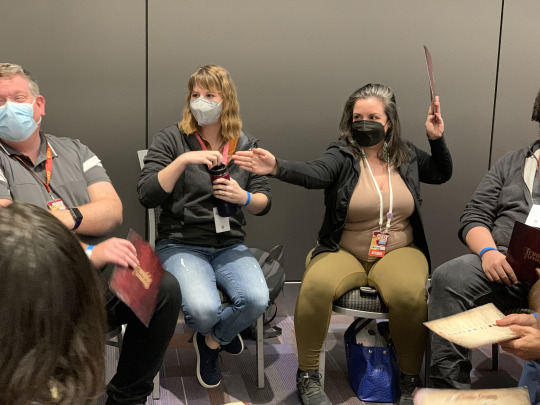
What even is information, anyway?
So far, I’ve been treating “information” as everything that is told to a player by the Storyteller. However, there is a lot more that one can learn from the game than just that. I’ll quickly list a few things that I personally consider to be strong mechanical information to which logical deduction can be applied. These will be in the game no matter who is Drunk/Poisoned/etc.
1. Voting and nominating. While savvy evil players will be a bit tricky in their voting and nominating, such as voting for one another, there are some things you can rely on and watch out for. Minions won’t cast a deciding vote that causes their Demon to be executed (without a backup). Players who get a lot of votes must have been voted for by some evil players. Players who vote in ways that contradict their arguments are often evil. There are many things along these lines that can be gleaned from voting.
2. Who talks to who, and when. It’s very unlikely, for instance, for a Demon to be able to accurately bluff being the Undertaker unless they’ve had contact with a Spy or the group is being very open about what characters they are. You can accurately deduce the information “This player is the Undertaker” by concealing characters and watching who they talk to.
3. Deaths, and lack thereof. Bad Moon Rising teaches that who dies at night is strong information. However, this can be applied to any script. Watching who dies will tell you a lot, and a night of no death does as well.
4. Bluffs and claims. False information that is made up by the evil team is still information. Analyzing it to find contradictions is still useful. A lot of the skill in being evil comes from bluffing realistic information that can create reasonable worlds. Inexperienced players won’t be able to do this well, so one expression of skill in the game is analyzing information and catching these bluffs.
Now, one last point regarding information:
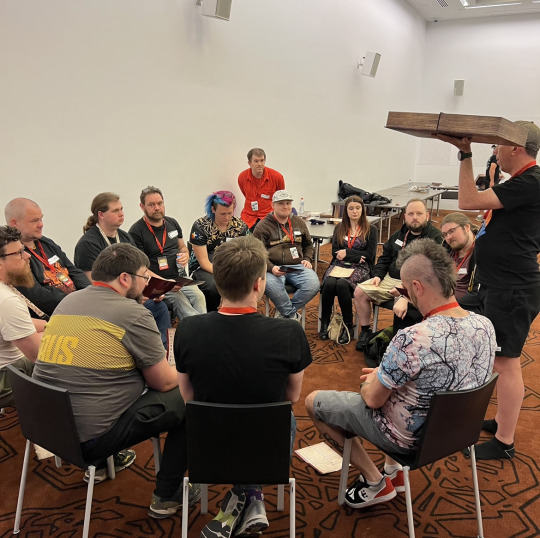
All good players’ information is true. Always.
What?? There’s no way. That Investigator learned that one of those players was the Scarlet Woman, but neither was.
Well, yes and no. All good players receive true information always, but only if you know how to translate it.
It might help to think about how we can encode this information more formally. For instance, we could say the Investigator learned something like:
“Player A is the Scarlet Woman OR Player B is the Scarlet Woman OR Player A is the Recluse OR Player B is the Recluse OR You are the Drunk OR The Poisoner targeted you.”
So, saying “Or I could be Drunk or Poisoned” is really a fairly accurate way of transmitting information, though a redundant one. This information is a lot less specific, but it is definitely true. And, by combining many such pieces of information, along with game rules/facts such as “Only one player can be poisoned each night” and “Only one player can be the Drunk,” you can eventually eliminate many of those possibilities. The skill comes from doing so quickly, and knowing which possibilities are so unlikely that they aren’t even worth considering.
This isn’t to say you’ll always be able to untangle the information and figure out who is Drunk, for instance. But I hope that it goes some way toward assuaging the complaint that “any information could be arbitrarily true or false.” The logical statement I put above is the full version of the Investigator’s info, and it will always be true.

Executive Order (the most common mistake)
One of the biggest mistakes the good team makes is just choosing awful executions at the wrong times. Even if you truly have no way to divine who the Demon is, you can at least execute players who might be the Demon to maximize your chances.
I’m not going to go into extreme depth here -- this is a subject for a whole other essay -- but I’ll try to get the main idea across with an example. A super common mistake I see: a Recluse is the only player claiming to be an Outsider in a game with 2 Outsiders by default. The town executes them. This is terrible, because that Recluse is mechanically guaranteed to be Good as long as nobody else is claiming to be an Outsider. You’re missing a chance to eliminate the Demon, a Poisoner, etc. A similar situation can arise when the town decides to execute a Washerwoman who confirmed themselves to a trusted player (though the Spy, for instance, can sometimes make this line of play necessary; as you may expect, there are plenty of caveats and exceptions).
Also, rarely skip executions. Executing is how Good wins. So many games that come down to a coin flip only do so because the town skipped an execution earlier in the game. I’ve lost a game by trusting a Mayor who turned out to be the Drunk, but it felt completely deserved because we had wasted an earlier execution, and otherwise would have only had one Demon candidate. Anyway, I’m getting a bit away from the original point about information in the game, so this is probably a good place to stop for now.
The overarching point of all of this: the information that is given to you doesn’t decide the game for you, the way you play the game decides what information is even available.
One last thing.
BOTC is a social team game. No matter how good you get at solving the puzzle, you’re going to sometimes just lose because you can’t convince your team to believe you or trust your logic; deduction and communication are two very different skills, both of which are essential to good play.
13 notes
·
View notes
Text
On Spinning a Good Yarn
by Benjamin Burns
Ten days ago, Steve asked me, in the kind of oddly-specific-yet-simultaneously-open way that only Steve can, to write an article about my journey to becoming a good storyteller. To be honest, my immediate thought was that I’m not really that good of a storyteller. I can think of a dozen STs who have a better grasp of the rules than me. Certainly, if you read any of the comments on the No Rolls Barred Plays Blood on the Clocktower videos, you’ll learn that I am instead an incompetent, evil lizard-man from outer space, who is here to steal the sun.
So I spent the next week mulling it over, gathering all of the handy tips and tricks I’ve learned over the years. I was preparing to talk about how you should always double-check your grimoire at the end of the night phase, to ensure you haven’t missed anything. Or perhaps explore how certain combinations of characters can leave avenues of bluffing open for the evil team. But the more I thought about it, the more I realized that simply knowing the rules and having a bunch of strategies in your mind is not what makes a good storyteller. So here’s the story of how I became a ‘good’ storyteller.

I first came into contact with Blood on the Clocktower in the summer of 2018. At the time, I was working as a freelance games journalist, trying to get my writing career off the ground, whilst also managing a board game cafe in the English city of Derby. One of our favorite things to do at that cafe was to wait until closing time, and invite anyone who was still there to join us for a lock-in. Then we’d grab a few beers and play social deduction games. Classics like Werewolf, Avalon, and even Cosmic Encounter would regularly see the table during those beer and bluff fueled evenings.
When the owners of the cafe announced we’d be going to the UK Games Expo, I decided to check out what cool stuff would be there and that’s when I saw this video on the UKGE’s website. I was utterly blown away. A social deduction game, like Werewolf, with no elimination, in which evil characters can cause good characters to get false information. Seeing it was like having some sort of switch flipped in my brain and I found myself wondering how I could ever go back to enjoying Werewolf again, now that this clearly superior set of mechanics existed. ‘It must be horrendously unbalanced or something’ I thought to myself. ‘There’s no way you can run a game like this without elimination.’
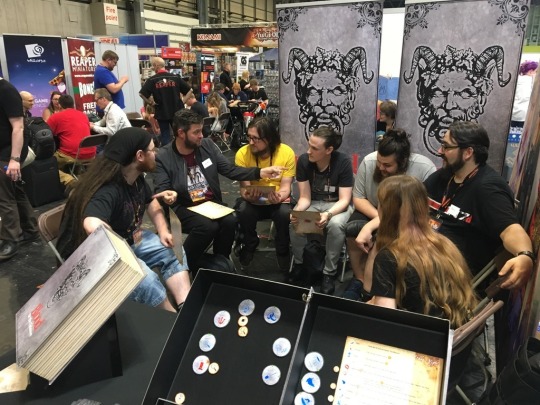
So we rocked up to the UKGE and I immediately made my way to this tiny trestle table that housed Blood on the Clocktower’s little corner of the con. Sat behind it were two Aussies, who I’d later come to know as Evin and Sarah. I immediately started gushing to them about how cool I thought their game was, and how I couldn’t wait to check it out. In my excitement, it hadn’t actually crossed my mind that this game might be a very small, completely unreleased indie venture, by a bunch of total game-producing noobs. I just assumed it was an already established product that had passed me by somehow. Consequently, when I started fan-boying over them, they were completely taken aback and probably a bit terrified! Nevertheless, I came back to the booth over and over again during the weekend to keep trying out the game. By the end of the con, I was utterly converted and asked if I could get involved somehow. They were so delighted by how enthusiastic I was that they offered to send me a prototype copy. Thus began my journey from chubby, hairy nerd to chubby, hairy nerd who is also a storyteller.
In the following months I would run a bunch of games, mostly at our board game cafe. It quickly became apparent to me that I couldn’t treat Blood on the Clocktower as though it were Werewolf. By which I mean that I couldn’t simply be a referee or an adjudicator of some kind, disconnected from the activities of the players. Because the game requires input and mechanical decision-making from the GM, it can’t be run like a team sport or a competitive tabletop game, it needs to be a narrative, role-playing experience.
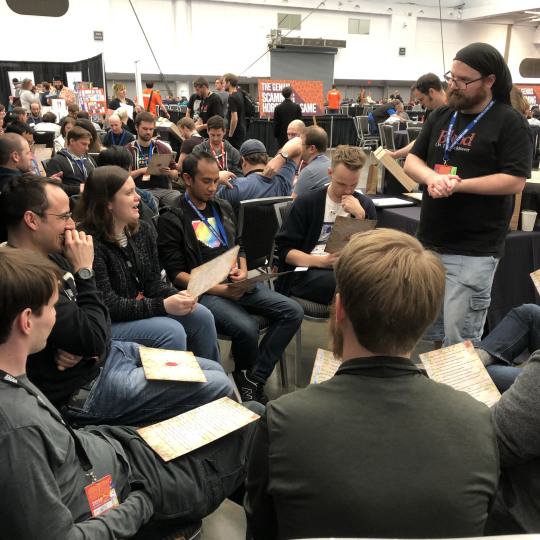
It was generally the same group of people that played each week, so I began to focus almost exclusively on the social dynamics of that group. When announcing a death I wouldn’t simply say “Lydia died in the night”. I’d instead say something like “you’re all going to be shocked to hear this, but it looks like Lydia might not be on the evil team for the first time this month, because she somehow perished in the night.” I’d flap about like an idiot, waving my arms around as I spoke, raising and lowering my tone in a ham-fisted attempt at dramatic expression. And do you know what happened? Everyone had a good time…even when the game itself was crap, usually due to me screwing things up. I came to understand that, unlike every other game I was running, the role-playing experience in Blood on the Clocktower came not from playing the role which the game assigned you, but from the role which the group’s meta assigned you. Always-evil Lydia, through no decision of her own, had become the group’s megalomaniacal, evil genius. When she died in the night, it was our group’s micro-version of Darth Vader’s “I am your father” or (spoiler alert) Ned Stark’s execution. It surprised people.
I’ve often asked myself why that group always had such fun, particularly when so many other social deduction games have a reputation for being toxic and unwelcoming. I think it’s ultimately because my players were enjoying one another’s company at least as much as they were enjoying the game. They were humanized in each other’s eyes and that meant that, no matter how good or bad the game was, they were always going to have a good time. In much the same way that when you go out on a weekend, you’re not there just to drink beer, you’re not there just to listen to the music in the bar, and you’re not there exclusively to have a conversation with friends. It’s the combination of all of these things that you’re enjoying. So when the tunes are crap and the beer tastes like piss, you can still have a good time.

By April of 2019, the game had experienced an insane Kickstarter campaign, having achieved almost 1000% of its funding goal. I felt like I could be more than just an enthusiastic fan, so I spoke to Steve about becoming a more permanent part of the team. Sure enough, I was welcomed in and started regularly running games at conventions.
Now it’s easy to ensure your players have fun when everyone knows one another. But at a convention you’ve got nine total strangers, all with different ideas about what makes a fun game, probably all with massively divergent expectations of the kind of social conduct they’re comfortable with. Yet you’ve somehow got to ensure they all have fun whilst arguing with one another and accusing each other of being deceitful liars. I don’t think many people appreciate just how truly difficult it is to be a GM at a convention.
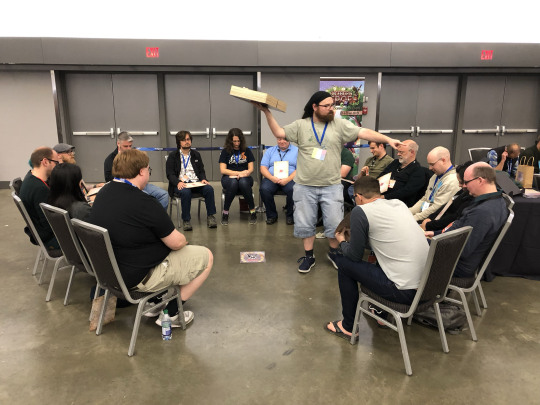
So I applied what I’d learned from my time running for friends. These people were not a group of familiar pals with a meta and an idea of each other’s personalities, so I simply decided to make them into that over the course of the game. “Good morning everybody” I’d say, as I pointed to Dave with his Metallica t-shirt on. “I’m afraid we’ve now learned for whom the bell tolls. It looks like it wasn’t the sandman who visited Dave last night!”
Now this might seem like a shit Metallica pun, from a circus clown, with an overrated sense of his own comedic genius. And that certainly is what it was (har har). But it served an important purpose. To the other attendees in my game, Dave was no longer just some stranger at a convention who happened to be playing with them. He had become Dave, the fan of heavy metal, the guy whose death made us all laugh. As for Dave, who sadly died first, something which could easily make someone with a less charitable personality upset. He now associated his death with a joke, with everyone smiling, and with the GM showing that he too enjoys a bit of thrash metal.

Over the course of that game and many others I ensured that when I spoke to the players, it wasn’t about what was mechanically happening behind the grimoire, but on what was physically happening in the town square. I’d compliment people for boisterous and impassioned accusations, or logical and well-articulated defenses. I’d pull random players aside from time to time, to ask them if they were enjoying the game or if they had a theory on who the demon might be. To put it bluntly, I spent my energy on letting them know that I was having fun and that I wanted them to have as much fun as me. From my time touring in bands, I’d learned that in 99% of situations, if the band were clearly having fun, the audience would too. I’ve seen bands that could barely play their instruments, utterly captivate an audience, all because they were visibly having a blast. I’ve also seen absolute maestros totally tank on stage, because they were clearly not into what they were doing.
And therein lies the essence of good storytelling, or at least my peculiar version of it. It isn’t about knowing the rules, although that certainly helps. The main ingredient of good storytelling is right there in the name of the role. Spin a yarn, make your players feel invested in each other and in you. It doesn’t matter how you achieve this, and you’ll certainly find a way that works for you. My buddy Edd, for example, has created a Spotify playlist full of songs that relate to the game’s characters, such as ‘Poison’ by Alice Cooper and ‘Moonchild’ by Iron Maiden. He uses it to cover up the sound of him moving around during the night phase. Whenever I close my eyes and hear some cheesy song that is tangentially related to BOTC, blaring out, I’m reminded that this guy is having so much fun playing Clocktower that he sat down and created a 100 song playlist, exclusively for use during a 90-second portion of the game.
So…have fun, enjoy your players, and most of all, don’t worry. If you’re enjoying yourself and if they’re enjoying themselves, you’re doing absolutely fine!

#BloodOnTheClocktower#Storyteller#Storytelling#DaddyBen#BOTC#ThePandemoniumInstitute#SocialDeduction#TabletopGames#Bluffing
29 notes
·
View notes
Text
April 2022 - State of Freight
Hello Everyone, this is Evin here again with a delivery update. There’s good news on most fronts with mixed news on one front.
State of Freight
All games bound for boats have left the Panda GM factory in Shenzhen. The consignment was split up into four parts, going on different sea lanes: Australia, UK, Europe, and the US.
The UK consignment was the first to leave the factory, departing on the 7th of April.
The European and Australian consignments left not long after, on the same day as each other - the 11th of April.
With the US consignment we were less fortunate, and had to deal with a series of bureaucratic obstacles from the IRS and from US Customs & Border Protection before freight could be finalised. The US consignment left the factory only a few days ago, on April 27, and is due in the US in mid-June.
The small consignment due for China is yet to leave the factory but will likely be freighted within the week.
Given that we’re delivering over two years late, we’re not going to stand on ceremony and shoot for some kind of unified global release date. If we can get you your copy of BOTC, we’re going to get it to you as soon as possible. This means that some backers could be getting their copy of BOTC as soon as mid-May, whilst others will be waiting until the second half of June or even into July. We’re sorry that the good folks in North America will have to wait longer than everyone else, but holding delivery on everyone else’s copies won’t get those ones there any sooner.
If you want to track the vessels for each consignment, here are the boat names and some handy links:
Australia - OOCL Italy (already arrived in Sydney)
UK - CSCL Atlantic Ocean
Europe - HMM Hanbada
US - Ever Fair & Gunde Maersk
Confirming Delivery Addresses
If you want to update your delivery address, please check the email that you received from CrowdOx in early March for the address update link.
If you’re in Australia or New Zealand, you need to have your final delivery address locked in by Friday May 6. Any changes after this may incur an extra cost.
Changes of address are fine in-country up until the relevant consignment arrives in your region. Changes of country may be possible still, just email us at [email protected] if you need to do this.
If you made your pre-order via our online store and not CrowdOx, please respond to your order confirmation email to update your delivery address.
That’s all for now. By next month some of you should actually have your copies of Blood on the Clocktower! Thank you for sticking with us. We’re almost there.
Sincerely,
Evin
#Kickstarter#Manufacturing#BOTC#BloodOnTheClocktower#SocialDeduction#Shipping#Freight#Bluffing#TabletopGames#ThePandemoniumInstitute
3 notes
·
View notes
Text
Mid-March 2022 Mini-Update - Lockdown in Shenzhen
I’m afraid we’ve had some exasperating news. The Chinese government has locked down the area in which Blood on the Clocktower was being assembled, literally two days before it was due to be completed (locked down on the 14th, was due to finish assembly on the 16th). I’ll reproduce the email below, in its entirety, as we received it:
Unfortunately our factory has been ordered to close by the local government, and we are set to re-open on March 21st. We are optimistic that our factory will reopen on March 21st; the reason for closing all non-essential businesses is due to the daily Covid cases rising to 86 in Shenzhen - Shenzhen has a population of 17.5 million people. I hope we can both agree that making sure the Panda staff working out of Shenzhen, and keeping the people of Shenzhen safe, is very important.
This does mean a delay, we were in the final 2 days of assembly before we had to close - I will assume the majority of goods are ready for shipping preparations - I won’t be able to confirm the actual delay until our team is back in the factory.
I think we can all agree that none of us would like to jeopardise the safety of Panda’s employees. Furthermore, even if we did, we have absolutely no say in the matter and no control over what regulations the Chinese government enforces.
On a positive note, it seems quite likely that the delay will only be a week. Assuming this is the case, it is likely to have a very minimal effect on the delivery timeline.
3 notes
·
View notes
Text
February 2022 - Delivery Timeline, Shipping Address Confirmations, Mass Production Copy, and an App Preview
Hello everyone. I’ll dispense with the formalities and get straight into the info, as we’ve got a lot to cover this month.
Delivery Timeline
First of all, the important stuff, where are we at with regards to delivery?
Currently, all components for Blood on the Clocktower have been fully produced and Panda Manufacturing is in the process of assembling each copy (essentially putting all of the components inside each box). Panda have told us that this should take two to three more weeks and they expect the games to be ready for pickup by mid March.
Ocean shipping to the west coast of the USA should take roughly four to five weeks. It’s difficult to know exactly how long it will take for games to be mailed from the USA fulfilment centres to various parts of North America, but we can reasonably assume that backers on the West Coast will get their copies some time around mid-to-late April, with the rest of the USA and Canada likely being a week (or however much longer it takes for a parcel to get from California to your house) later.
Ocean shipping to Europe is a little more chaotic at the moment and will take a tad longer. We expect it will be five to six weeks before copies land at fulfilment centres there. This essentially means that the European timeline is a week or two behind the USA. Folks in the UK and mainland Europe can expect to be receiving copies in late April or perhaps early May. To my fellow Brits, your copies will arrive when the weather goes from awful, to still awful, but also a bit muggy.
Aussies and Kiwis. You win at shipping lanes. We expect copies to arrive at fulfilment centers in your neck of the woods in three to four weeks, meaning that you’ll be getting your copies from the middle of April.
We expect that for China and southeast Asia, the delivery and fulfilment will be pretty much identical in time-scale to the Australia and New Zealand timeline, possibly with a little more speed.
The rest of the world will be served by fulfilment centres in China and Europe. These are much more difficult to predict, but they can expect to be, in some cases, a little longer than the European timeline.
Shipping Address Update
Many of you have been updating your shipping addresses recently, some via CrowdOx, others by emailing us for help with it. Within the next couple of weeks, you will receive an email from CrowdOx with a direct URL that will take you to a page where you can update your shipping addresses. If you’ve lost your email account since backing the game, or if you simply need some extra help updating your address, you can still email us at storyteller[at]bloodontheclocktower.com and we’ll get it sorted for you. But please do get that done as soon as possible, because time is very much running out on that front.
Copy Number One
Panda immediately mailed us the first copy of the game to be fully assembled. With a game that contains this many components, some of them quite experimental, the anxiety has always been there that something would be wrong with it. Barring one minor issue (see below) I’m absolutely delighted to be able to say that it has outstripped all of our expectations. The art looks gorgeous, the components are robust, and everything functions as it should. Here’s us trying to make the tokens fall out of the box. Spoiler: they don’t.
youtube
Also, check out this video of Evin, Steve and Andy unboxing it.
youtube
Finally, here’s what the whole thing looks like once it’s been fully decanted.
youtube
Packing Everything In
The more eagle-eyed among you may have noticed that in the unboxing video, there is a dent in the felt. This was caused by the token bag being packed too close to the felt and then being pressed against it during the mailing process. This is not an issue that will occur during regular use, as there won’t be several sheets of un-punched tokens in the box once you’ve used it.
Panda have subsequently altered the way they intend to pack the game and have kindly sent us a video showing us this process in action. Check it out.
youtube
Fancy New App
The app just had its first ever playtest and the results were very cool. It has some pretty awesome features, including voice/video chat, the ability for the Storyteller to give out night info via the game’s interface, and even a grimoire reveal at the end of the game. You can have a cheeky peek at it in this video: https://twitter.com/i/status/1496637915128020998
'Til next Time
That’s all for this month guys. I’ll sign out with a bunch of pictures of the components from our unboxing of the game. I hope you’ll agree that they all look pleasantly vibrant as well as a nice and spooky!
- Ben
#bloodontheclocktower#botc#manufacturing#socialdeduction#tabletopgaming#ThePandemoniumInstitute#Bluffing#TabletopGames
1 note
·
View note
Text
January 2022 - MPC Incoming, Decepta Con, Kickstarter Almanac Preview, and the App
Hello Everyone,
I hope you’re all having a pleasant new year, or perhaps looking forward to an upcoming one, depending on where it is that you call home! I’m just typing up a quick update to let you all know that we’re still rolling onwards with production and are now quite close to completion. In fact, about 5 days ago, Panda sent us the following email.
Hi Evin, Hi Steven
Congratulations! The first mass production copy of your project has recently been completed.
Please note that all components have already been produced and any changes will incur a cost at this point. Also note that this copy has not been dried in our climatisation chamber so minor board warping can be expected. We send the mass production copy to you as soon as it is ready so that we can have an early approval. All other units are being climatised for 3 to 5 days to minimize the occurrence of board warping.
This email was accompanied by the following photographs.



These are a few of the first copies produced and assembled by their manufacturing plant. They’ve been mailed to Sydney, so that they can be examined by Steve, Andy and Evin. This examination is purely a formality and production has not paused to await the go-ahead or anything like that. We expect this whole process to be done shortly after Chinese new year. This should give them enough time for assembly to meet the current projected completion date of March 5th. Panda’s advice is that assembly typically takes 1-2 weeks. We’ve allowed enough time for 4 weeks in this prediction.
Decepta Con
In other news, some familiar faces are going to be at Decepta Con a few weeks from now. Some of you may know Tyler, Capelli, Adam, and Hayley from their Twitch streams, as well as Emily, author of the popular Catfishing custom script. These guys will all be there, running games, and beginners are welcome.
Kickstarter Almanac
The special almanac PDF that will be sent to Kickstarter backers is almost done. We’re giving it a final proof-read before considering it completed and ready for consumption. This almanac has been deliberately created and rendered in such a way that it retains the beautiful art and style of the almanacs in the box. However, we’ve also kept it mostly black & white, so that backers who wish to print it won’t have to spend a fortune on ink.

The BOTC App
Finally, our official app is getting its first proper playtest next week. While it’s based on the fan-made version by Bra1n, it has some pretty cool new features, including the ability to change the colors of tokens to indicate when a player has changed alignment. Naturally, when we first saw this, we had to create the weirdest grimoire ever.
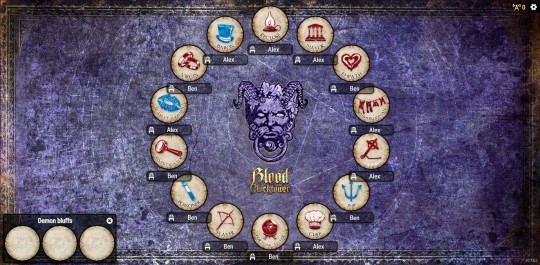
That’s all for this month folks. While we had a few cool bits of news to tell you, this update was mostly just us checking in and letting you all know that we’re still here and still very much active.
- Ben
#Kickstarter#Manufacturing#BOTC#BloodOnTheClocktower#Update#SocialDeduction#ThePandemoniumInstitute#Bluffing#TabletopGames#TabletopGaming
4 notes
·
View notes
Text
December 2021 - Manufacturing Photos!
Hello folks, it’s Evin here with a quick end-of-year update.
Projected Delivery Timeline
There’s not a great deal to report in terms of timeline. Omicron is rocking everyone’s world at the moment, but there hasn’t been any indication that this will further disrupt the most recent projected timeline for production and delivery. Just to recap quickly from the previous update, that’s around early March for manufacturing completion and late-April for delivery of most copies.
This doesn’t mean that there won’t be further delays due to covid and the myriad ways it can disrupt the global supply chain at short notice, but things are looking okay for the time being.
Photos!
Now onto the good stuff - Panda GM has sent us a few in-process photos of punchboard production from the factory that we can share with you!



In the years-long process of playing Clocktower, developing it, travelling the world to promote it, Kickstarting it, and finally finishing it & getting it to print among all the challenges we’ve faced along the way (self-inflicted and otherwise), few images have given us as much happiness as seeing these. It’s real, it looks great, there are enormous amounts of it, and it’s on its way.
To all of our backers and supporters, we hope you’re well and happy and safe wherever you are, and we wish you a merry Christmas and whatever holidays you're able to enjoy.
- Evin
#Kickstarter#Manufacturing#BloodOnTheClocktower#Update#SocialDeduction#TabletopGaming#ThePandemoniumInstitute#Bluffing#BOTC#TabletopGames
1 note
·
View note
Text
November 2021 - Update to Completion & Delivery Timeline
Hello everyone, I hope you all had a suitably spooky Halloween and are looking forward to a similarly enjoyable festive season. It’s going to be a short update this month, so let’s get straight into it.
The only production update of note is some information from our handler at Panda Manufacturing. I’ll reproduce her words exactly as we received them:
“The MPC should be finished and ready to send on January 15th, and the estimate EXW has slipped a little to March 5th 2022.”
What this means in layman's terms is as follows:
Completion timeline should now conclude in early March - specifically March 5th.
This projects most global delivery to be late April.
The MPC will be finished and ready to send in mid-January. (‘MPC’ stands for ‘Mass Production Copy’, which is the final copy we review and check before the game gets assembled.)
Obviously, this is subject to change based on the factory’s status with regards to the previously mentioned power generation issues, but Panda has a solid track record and we trust that they know what they’re talking about.
In other news, we’ve decided to upload a quickstart guide of sorts for Blood on the Clocktower. This is something that a lot of companies do, particularly RPG developers, and given that Clocktower shares a lot of similarities with pen & paper RPGs (namely the need for a GM and the playing of an individual role for participants) it seemed like a sensible move. It also hasn’t escaped our attention that a very large number of people are playing online, so we hope this documentation will make it easier for prospective Storytellers to run smoother games over Discord, Zoom and the like. You can find it, as well as more nuggets of wisdom, from Steve’s post on the BOTC blog:
Some Rules to Help You Get Started
Finally, I’d just like to point everyone towards the wiki again, which now has entries for all but one of the experimental characters included in the Kickstarter version of the game, with the last one expected to be up within the next three weeks. It’s a great way to get acquainted with those characters ahead of running them and a good source of tips and tricks for both Storytellers and players.
Thanks for checking in and be sure to stay wrapped up warm or reasonably hydrated, whichever hemisphere your needs arise from!
- Ben
#Kickstarter#BloodOnTheClocktower#update#socialdeduction#gaming#tabletopgaming#ThePandemoniumInstitute#Bluffing#BOTC#TabeltopGames
1 note
·
View note
Text
Some Rules to Help You Get Started
Many of you are curious about Blood On The Clocktower, and have decided to either make your own Grimoires, or to play online via one of the many fan-made digital platforms. I'm hoping that the following excerpts from the rulebook will be helpful in getting you started. Whilst they are certainly not the complete rules, they should be enough to answer the most basic questions that arise about how to Storytell a game of Trouble Brewing, and maybe even beyond.
The unfortunate delay of the game has resulted in a lot of people learning to play Blood On The Clocktower either from hearsay or trial and error. This should make things a little easier: BOTC Basic Rules
These PDFs can act sort of like a "quick start" set of rules to get you familiar enough with the basics, should you be interested in running a game or just want to get familiar with things before your physical copy arrives.
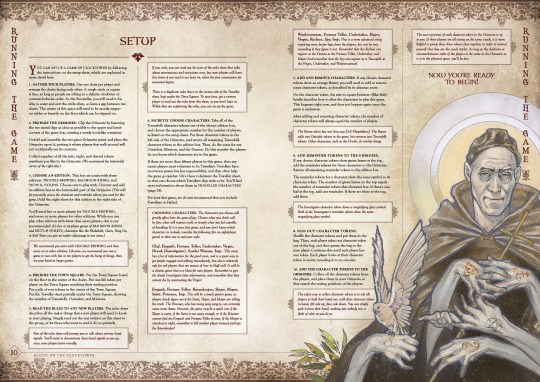


Also, I've found it to be incredibly helpful to new players to hear the following rules explanation before their first time playing. As a Storyteller, I read this out (or ad-lib it) before every game I run, and it is a great introduction for the players: BOTC Rules Explanation for New Players
It covers the main points that new players need to learn before beginning, ignores the more finnicky elements that nobody needs to know yet, and gets the group playing with a minimum of fuss. Reading this aloud before a game usually answers a lot of player questions that would otherwise occur during the game. It also acts a short "What am I supposed to be doing?" guide.
If you use this sheet, I recommend waiting until the first nomination is about to occur to read out the part that deals with nominations and voting. The players don't need to know this information until this point, and will retain much more information when the rules are read out when they need to use them.

Good luck, and have fun.
- Steven
#bloodontheclocktower#rules#bloodontheclocktowerrules#socialdeduction#socialdeception#gaming#tabletopgaming#hiddenrole#botc#bluffing#tabletopgames
15 notes
·
View notes
Text
October 2021 - Delay of Game, Global Supply Chain Woes, and Pre-Order Price
Hey Everyone, it’s Evin here this time with this month’s update. As you’ve likely surmised from the title, we are experiencing another:
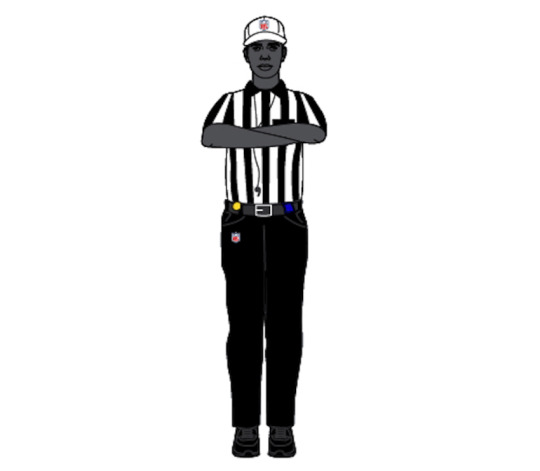
Delay of Game
Based on the most recent advice we got from the manufacturer, Panda GM, they expect the game to be fully completed and ready to go onto boats at their factory in China around mid-February 2022. This timeline comes with a few massive caveats, which I’ll go into more detail about below.
The clear bad news is that this is another extensive delay. The good news is that this delay is unlike the previous delays we’ve experienced. The game is in print at the factory and the wheels are churning to simply get it printed and assembled. To put that more bluntly: The things holding the game up are no longer the trials & tribulations of us first-timers, it’s in the hands of more seasoned professionals now. Where previous delays were primarily related to the ability of ourselves and our contractors to complete the game’s visuals in a timely manner (and, importantly, in a satisfactory manner), and the need to resolve the ~300 ambiguous rules issues that were very helpfully raised by fans of the game, during & after the campaign, this new delay is largely due to all of the Covid-related global supply chain issues that are currently affecting just about everything in just about every industry and country.
Since the completion of the pre-production copy, we’ve had to have a fair few more back-and-forths of file adjustments with Panda as certain tics to be corrected or minor sizing improvements to be made were discovered, before going into print proper. We wanted to wait until these bugs were resolved and until Panda had a handle on how all of the Covid-related global supply chain issues were affecting them, and our project in particular, before we came out with an updated timeline. The expected completion in mid-February is disheartening, but it seems to appropriately accommodate the current situation in China. Planned power outages are currently common around China, and whilst Panda has advised us that they do receive a day’s notice before such outages are due to occur for their own factories, so they're not completely disruptive, the reality of them must be factored into their projected production timelines.
Re-Reassess Your Address
In September we asked everyone who backed or ordered the game to make sure their address was locked in by the end of October. Obviously with this latest blowout in delivery timeline, addresses needn’t be locked in quite so soon. We’ll give a new deadline in future, but generally we’ll want addresses to be locked in around the time the game is going onto boats, so expect that to be around mid-February if this new timeline holds.
To update or confirm your delivery address, if you’ve backed or pre-ordered the game, simply login at the CrowdOx portal here using the email address you used to back the campaign with: https://portal.crowdox.com/
If you’re having any issues accessing the portal, or if your change in address requires a change of country, please email us at [email protected].
Potentially Good News on Sea Freight
The silver lining with this delay in manufacturing is that it means we stand a chance at avoiding delays related to sea freight. As you may have already heard, there is currently a global shortage of shipping containers and backlogs at ports around the world that is leading to extensive delays and spiraling costs when it comes to international sea freight. However, mid-February, after Chinese New Year, is typically the low season for sea freight, so it’s possible that some of these issues will have resolved themselves by then. Of course, it’s just as possible that the current issues are so immense that the shortage of containers and backlog of shipments persists until then, leading to further delays. Right now it’s impossible to know for sure.
One way that the freight crisis, in particular, has affected us is that it caused us to lower our initial print run of the game from 14,000 copies (combined total between Kickstarter versions and standard pre-orders) to 13,000 copies. If things are going to cost more to freight in 4-5 months than they will in 12-18 months, it makes sense to have a few less things to freight now and more things to freight later. Lowering the print order just a little bit is a precaution we’ve taken, but one that still leaves us enough spare copies to continue to accept ongoing pre-orders, and further orders once the game delivers. It also has the added benefit that the actual printing of the game will take a little less time. It means we may be returning for a second print-run sooner than we anticipated, but there are worse problems to have.
If sea freight is to revert to something resembling ‘normal’ by mid-February 2022, we’d then expect freight to fulfilment centres to take 4-6 weeks, and shipping from those centres to take 2-4 weeks. This would mean we’re looking at Blood on the Clocktower arriving in April 2022 - exactly three years from the Kickstarter campaign. Amazingly, while talking to our project manager at Panda, they mentioned that BOTC is still not the game they’ve worked on that’s taken the longest from funding to completion, and we’re still on track to have our game out well before we reach that ignominious milestone. Trumpeting that we’re ‘literally not the worst case scenario’ isn’t much of a brag, but at this point in the project, with the way things are in the world and the supply chain in the state it’s in, I’ll take whatever we can get. Personally, I’m just thankful that we’re finally in print, and that we’ve got the funds & support we need to see this through to completion. I’m especially thankful, as I’m sure many of you also are, that there’s no more tomfoolery with the art and the rules - it’s just the cold hard process of manufacture, assembly, and delivery, set against the challenging and often frustrating backdrop of a Covid-affected world.
A Word on the Price of Blood on the Clocktower
While we’re primed to talk about global supply chains and the interconnectedness of everything, this is a good time to talk about the price of the game. First and foremost: In light of the current supply chain crisis, and spiraling sea freight costs in particular, we want to reassure everyone that we’re still all good for funding everything and all good to go.
All the same: For the first time since the ‘late pledge’ period ended in 2019, we’re planning to raise the price for the pre-order of the standard game of Blood on the Clocktower, around the end of this month.
The Kickstarter copies cost $79 USD at the time of the campaign and for two months after the campaign, and the standard pre-order for the game since then has been $95 USD. Using one of the main accepted standard industry methods for calculating MSRP, based on the manufacturing cost & the freight cost, the price for Blood on the Clocktower, at the time of the Kickstarter in 2019, “should” have been set around $99 USD for the standard version, i.e. before any stretch goals are factored in. When you factor in the cost of the stretch goals, the MSRP for a Kickstarter version of the game would have come in at around $110 or $115 USD in 2019, if it was simply a product that we were producing from scratch to send straight into distribution. So the game is very late, but all of you who backed it at $79 are getting incredible value.
We chose to offer discounts on the KS version and the pre-order version for a number of reasons. To echo many of the things I said during the campaign itself two-and-a-half years ago, Blood on the Clocktower is a social deduction game on a far larger size & scale than anything else out there. For a genre where people were far more used to paying no more than $30 USD for a box about an eighth of the size, we didn’t want to freak people out while we were still an unknown quantity. We also wanted to generously reward people who opted to take a chance on something so new in the genre. Fortunately, because the margins on Kickstarter are relatively high when compared to the margins for putting a game into distribution, we were able to afford this discount. When it came time to shift from ‘late pledges’ to pre-orders, we accepted that selling ongoing pre-orders at this same rate of $79 USD would have been unsustainable. However, we were still a long way from delivering and didn’t want to charge the full MSRP (as it was at the time) before people had a chance to try it out en masse, so we set the price at $95 USD as kind of an ongoing, built-in, pre-order discount.
Now that we’re on the other end of pre-production and roughly 18 months into Covid, the same calculations applied to today’s figures lead to a much higher MSRP, due to increased manufacturing costs and exponentially higher freighting costs.
Manufacturing is projecting to cost more per copy than we first anticipated. Panda’s original quotes to us ended up being mostly pretty accurate, however there’s still been an increase in the per-copy cost largely on account of the custom-made corner protectors and special packaging that each copy will be packed with from the time it leaves the factory, so that the Grimoire arrives in great shape. Unlike most other games, the box for BOTC is an integral part of gameplay and not just a storage device, so it’s a priority that it arrives in the best possible condition.
Freight costs continue to rise and are giving no indication that they’ll revert to pre-Covid levels any time soon. In May this year, the projected cost of freight per-copy was almost double what it was when we launched in 2019. Current sea freight prices are now triple what they were at the launch time in 2019. This drastic rise in freight cost is the biggest driver in the increase in MSRP.
All of this means that the same MSRP calculations made at today’s prices land the game’s MSRP at $135 USD. (If you want to do the same MSRP calculation for the Kickstarter version of the game, it comes in just shy of $150 USD - again, incredible value for getting it at $79.) This means that anyone who’s pre-ordered at $95 USD has experienced something like a $40 discount.
As Covid has progressed since early 2020, and as the supply chain issues have mounted throughout 2021, we’ve witnessed many other creators raise the price of their games accordingly. For us, we were aware that we were still in pre-production, far from delivery, and that pre-order customers would still have a bit of a wait for their copy of Blood on the Clocktower, so we tried to hold off for as long as possible. Given that we still had the funds to make good on all of our commitments, it was possible to do so. However given that the freight crisis appears to have no end in sight, it’s incumbent upon us to think not just of our commitments to the backers & customers who’ve already ordered the game, but to also think about the future and our ability to make more games beyond this first print run. As such, we’ll soon be raising the pre-order price of Blood on the Clocktower in order to accommodate much of these increases in manufacturing and freighting costs. We’ll still offer a built-in pre-order discount, below the full MSRP of $135. Once the game is out proper, we’ll look at the viability of adjusting the price to reflect the full industry standard of what the MSRP should be.
Happy Halloween
It’s felt good to share some of the process & reasoning behind what’s happened in the past and what’s happening next, even if the news is largely poor. I’m looking especially forward to future posting with lots of photos of games on pallets and atmospheric shots of container ships navigating the high seas.
Steven and I have mostly been keeping our heads down while we’re working on a lot of the back-end stuff to do with running The Pandemonium Institute or getting all the support materials ready for the game’s release, as well as dealing with the usual curve balls that life throws at us from time to time. But we’re constantly heartened by seeing the fantastic community that continues to grow around this game. Really. Honestly, we can’t wait to get the game out and get out there again ourselves to join in all the fun.
Cheers, and Happy Halloween,
Evin
#bloodontheclocktower#socialdeduction#socialdeception#kickstarter#gaming#hiddenrole#covid#supplychain#covid19#tabletop#tabletopgaming#botc#ttgames#tabletopgames
0 notes
Text
September 2021 - Address Confirmation, BOTC Online, and Release Date Freight
Our latest production & delivery update is live over on Kickstarter.
There’s not a lot to update on this month, as we just cover:
Address Finalizations - the deadline to update your delivery address on CrowdOx is 31 October 2021
We’ve started working on our official BOTC app!
And a word about the release date.
Read it all over on Kickstarter.
Cheers,
Evin
#bloodontheclocktower#update#socialdeduction#gaming#tabletopgaming#ThePandemoniumInstitute#Bluffing#BOTC#tabletopgames
0 notes
Text
August 2021 - Fancy PPC & Other News
Now that you’ve had a few days to point your eyes at our initial photographs, in the last post, it’s time to go into more detail about the pre-production copy. I’ll be separating this post into three sections. First I’ll go over what they’ve absolutely nailed, which will make up the bulk of the post. Then I’ll discuss what we had issues with and how those issues have been addressed. Finally, we’ll talk about what wasn’t included and why it wasn’t included. But before I do, please keep in mind that the purpose of a pre-production copy is to iron out any remaining creases. It’s a dress rehearsal, so don’t panic if the actors get a few lines slightly wrong.
The Good
The Rulebooks are fantastic. We spent so much time getting these right, but there’s always that fear that the text might come out weird and unreadable, or the artwork might look all washed out and crappy on paper. But the rulebooks have absolutely outstripped our expectations and we’re just thrilled to bits with how awesome they look.
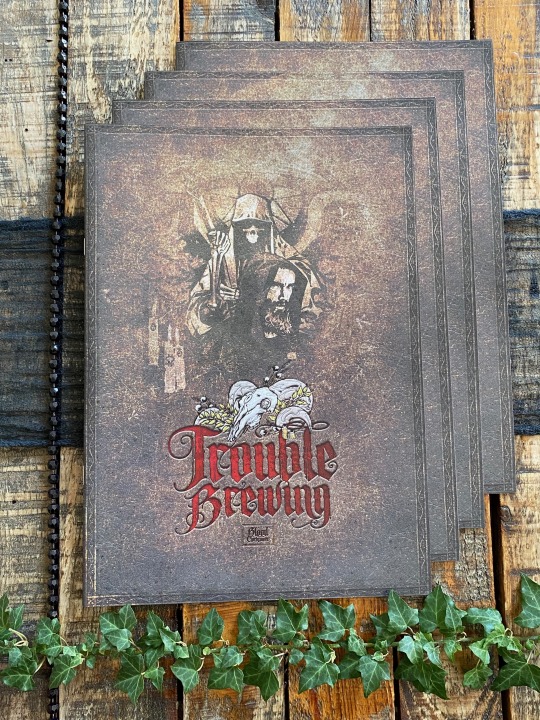
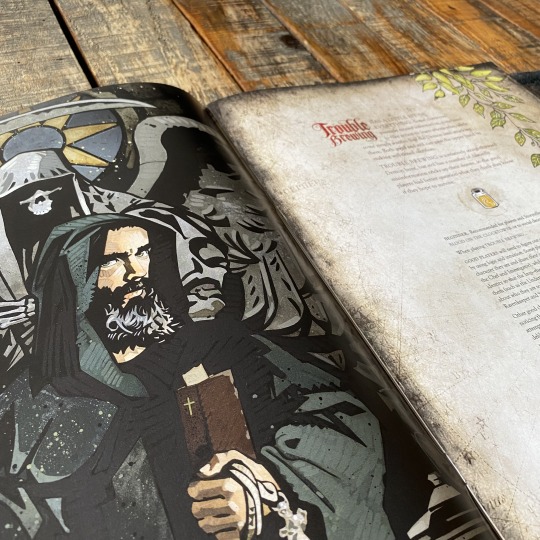
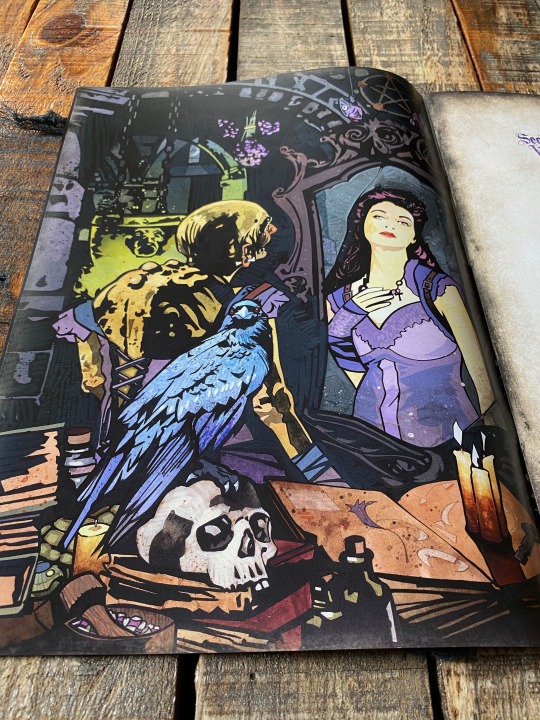
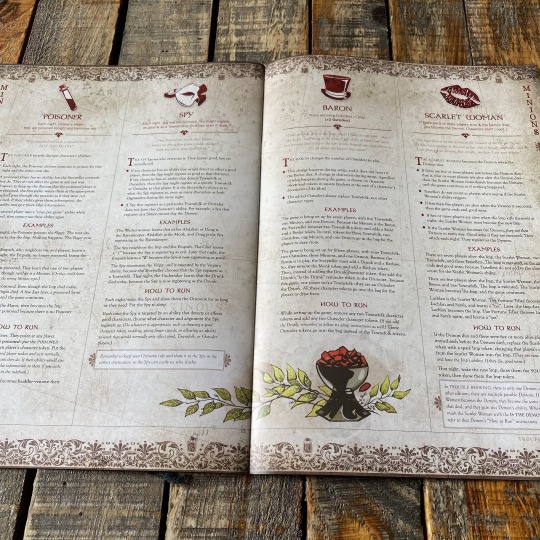
The Grimoire is extremely sturdy and well-built. We’ve slapped it around a fair bit and it’s clearly built to withstand a lot of punishment. This is good, because you will end up lobbing it around a lot.
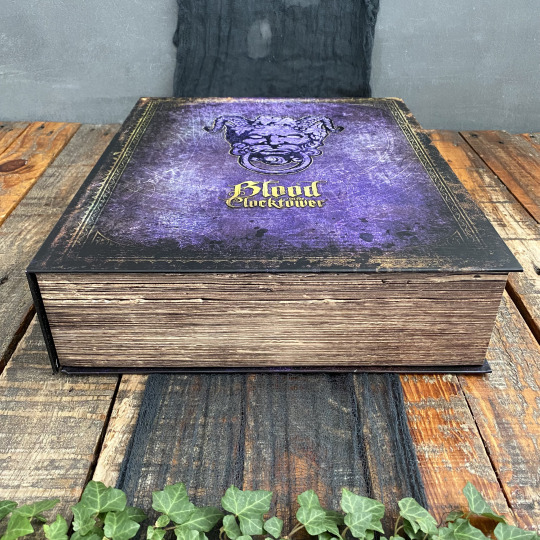
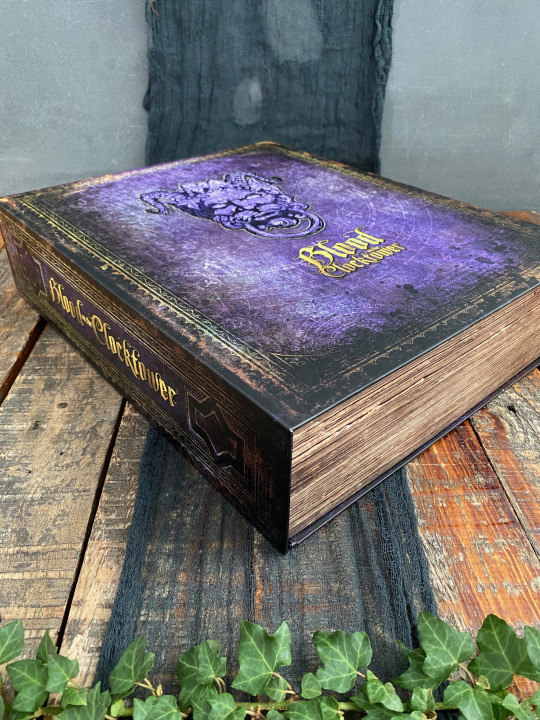

The Character Sheets are just wonderful. Not only do they seem to be even more durable than the previous white sample examples sent through, but they’re also vibrant and very easy to read.
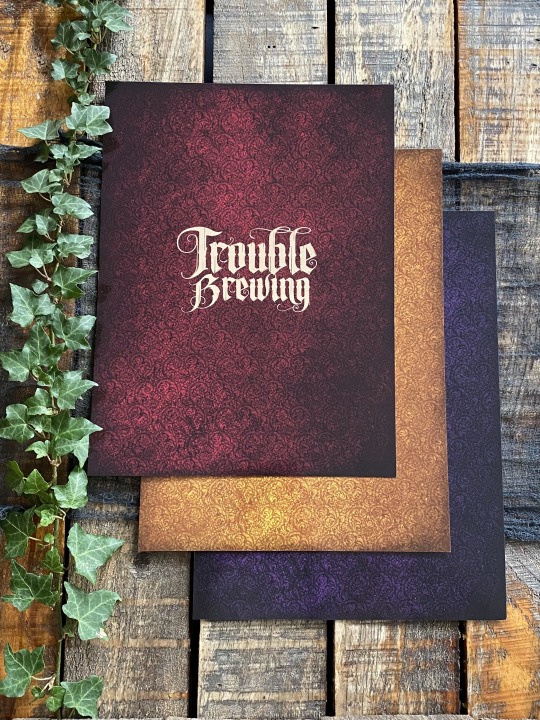
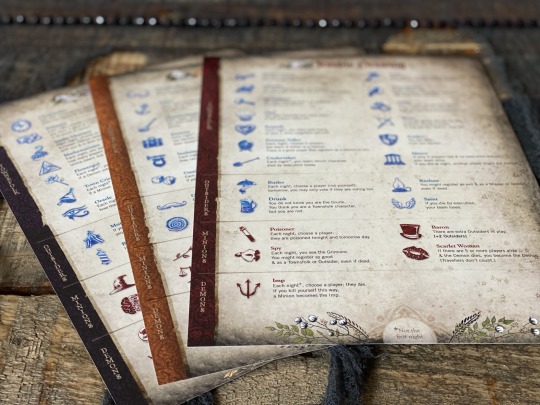
The Felt is fantastic. It’s arguably the weirdest part of the whole box, and certainly not something that your average board game producing factory is used to manufacturing. We honestly had nightmares worrying about how this particular component might need loads of extra scrutiny. But credit where it’s due, Panda Manufacturing have absolutely nailed it on their first try.
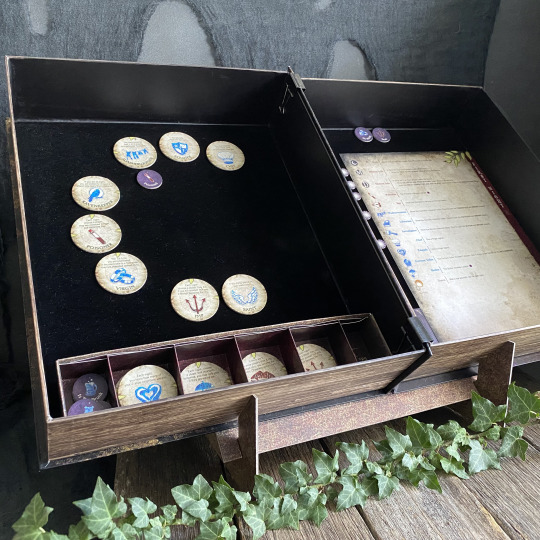
The Pages on the outside of the grimoire look so cool. This might seem like a little thing, but we made sure to get the lines on the edge of the grimoire to line up properly, creating the illusion of an actual, giant tome of eldritch lore! It’s those little touches that really add to the atmosphere of a game and, frankly, which make the difference between a good game and a great game. It’s mega satisfying to see it look so real.
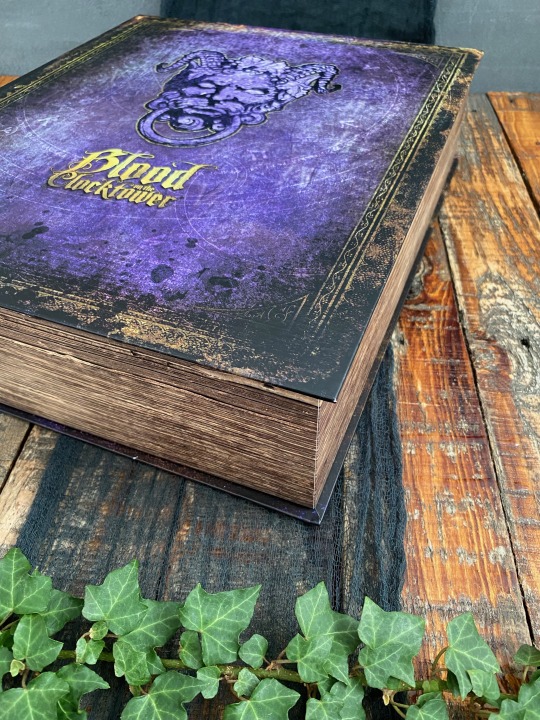
The Token Boxes fit together really well. They’re the perfect size to contain all of the necessary bits, but most importantly, they’re very sturdy. In a lot of our prototype copies of the game, the token boxes needed to be held closed with rubber bands, so we’ve ensured that the cardboard around the edge of these versions is nice & thick and keeps them closed naturally, as you can see from the pictures below.



The Bad
The Sleeve around the Grimoire is a little askew. It fits perfectly, but the folds in the PPC were in the wrong spot. It looks a little jarring if you know what it’s supposed to look like.
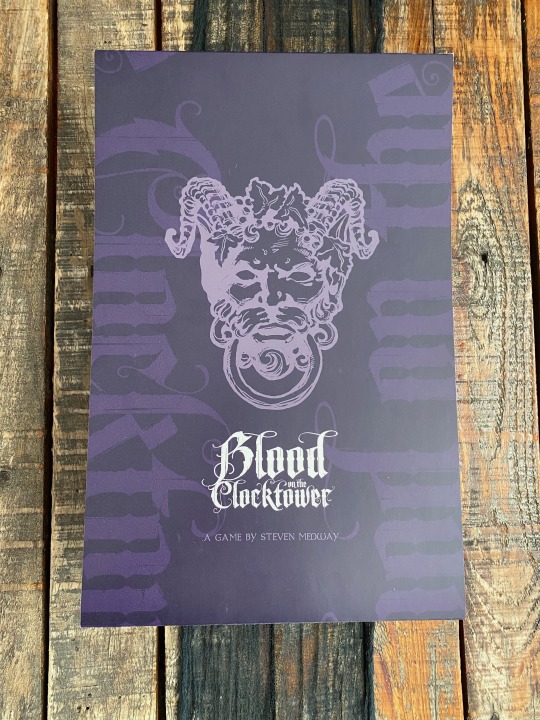


The Double-Sided Tokens, in some instances, have some pretty heavy drift on one of their sides.
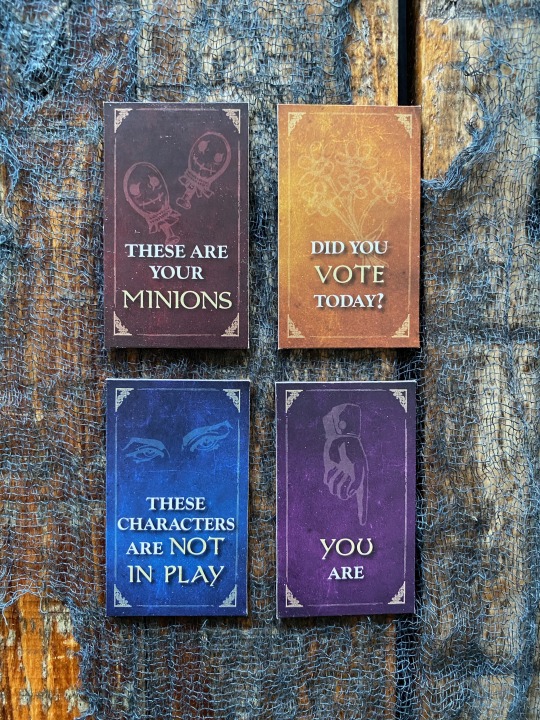
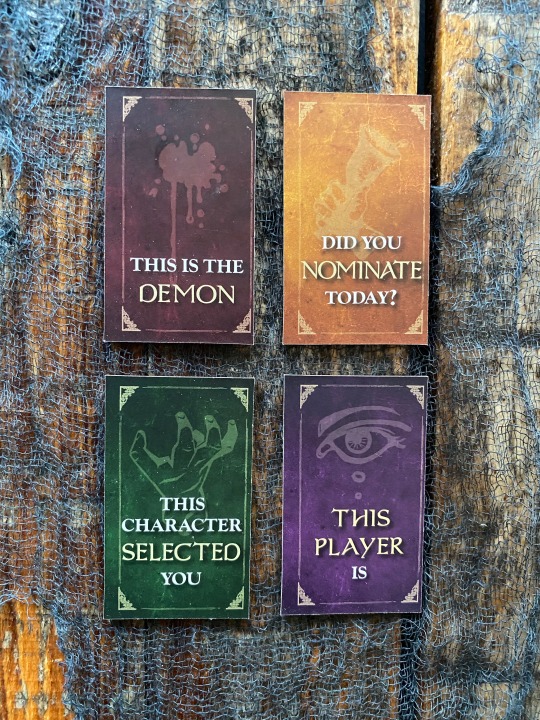
Both of the above issues have been confirmed by Panda as not being representative of the finished product. In their exact words, “this is normal in a PPC since the tokens are cut by a plodder and not die cut. In mass production, drift is a maximum of 1 mm in the worst situations. Don't worry this is typical for a PPC.”
The Absent
The Death Shrouds, Token Bags, and Plastic Sleeves were not in this most recent sample provided. This is because the PPC contains only printed products. We’ve already seen samples of all of these and approved them in advance. You can check the death shrouds out in this update from almost a year ago and the bags can be seen in this one, from May of 2020.
In Other News
If you’ve made a pre-order for Blood on the Clocktower and need to change your postal address, this can be done easily via the CrowdOx portal. If you do need to do this we’d appreciate you having it done as soon as possible, to ensure that your game is delivered to the correct address. We’ll have a final deadline for address changes for you in future. If you’re having any issues, or if you need to change your address to a different country, don’t hesitate to drop us an email at: [email protected]
We’ve received some questions regarding whether we’re still on schedule for our November 30th release date. Our initial estimates, regarding how long each step in the manufacturing would take, were quite conservative, providing for a bunch of potential issues at each step. Essentially, all of the times have a lot of 'padding' on them. At the moment, we’re still on track for the planned date, but if that changes at all it'll likely be to do with the current freighting crisis. We have the funds to absorb extra costs that we might incur, but we’ve got no control over shipping times, unfortunately. Having said that, our freight partner hasn’t yet suggested that we’ll be affected, but if they do then we’ll update the timeline and delivery expectations accordingly.
I’d also like to drop you all a link to the experimental characters section of the wiki, which has come a long way since our last mention of it. You’ll notice that almost all of the experimental characters are now included on it. The wiki really is a fantastic resource for getting to grips with individual characters and finding fun ways to play them, so please do go check it out.
Finally, I just want to point out that this will likely be our final major news on physical production. We’ll continue to check in with you guys every month, and you can expect more useful information to come along between now and release. But really, these final adjustments mark the end of our work on the game itself and the beginning of it transitioning into something that exists on your shelves and at your local board game stores. Thanks again for taking this journey with us, and I personally can’t wait to play this game with as many of you as I can convince to tolerate me!
- Ben
#bloodontheclocktower#socialdeduction#socialdeception#gaming#hiddenrole#tabletop#kickstarter#tabletopgaming#botc#ttgames#tabletopgames
3 notes
·
View notes
Text
August 2021 - The PPC Arrives
Hullooo!
The long-awaited pre-production copy is here and there’s a lot to be pleased with. We’re going to share just a couple of photos with you that we took as we were opening the box. In future we’ll do another, larger update, with some more professionally-taken pictures that will be much higher quality. But for now we just really wanted you guys to see this as quickly as humanly possible.
First of all, here’s a little snap of the box on some weighing scales. At 4,188 grams (about 148 ounces), it’s actually a little lighter than we’d expected, which is fantastic.

From the front, you can see that the sleeve fits snugly over the whole thing. The purples and browns mix together really nicely to create the sense of an ancient, regal tome, perhaps found in the depths of a cursed library.

The tokens look great on their punch boards. In particular, the actual role tokens came out looking really vibrant and easy to read.

Similarly, the rulebooks are just wonderful. The art looks absolutely gorgeous on paper and the colours really pop out of the pages at you.

The character sheets have never looked better. We were very impressed with how crisp and vibrant they are. They’re extremely easy to read, as well as navigate with your eyes, which is going to be crucial when you need to come up with a quick lie in a pinch.

Finally, here’s a snap of the back of the box, looking very ominous.

I’m absolutely itching to just throw another 30 pictures in here and show you all of the things. But I know the sensible thing to do is to wait until Andy has had a chance to properly photograph them and present them clearly to you all.
See you next time,
- Ben
#bloodontheclocktower#socialdeduction#socialdeception#gaming#hiddenrole#tabletop#kickstarter#tabletopgaming#botc#ttgames#tabletopgames
1 note
·
View note
Text
July 2021 - Wiki Updates, PPC Expectations, Freight Situation, and UKGE
In our July 2021 update there’s not a great deal to report. We cover:
Our ongoing improvements to the BOTC Wiki,
that the pre-production copy has not yet arrived but we’re expecting it soon,
the rising cost of sea-freighting (and that we can cover those costs),
and that Ben Burns will be at UKGE at the end of this month.
Read it all here!
Cheers,
Evin
#bloodontheclocktower#socialdeduction#socialdeception#gaming#hiddenrole#tabletop#kickstarter#tabletopgaming#botc#ttgames#tabletopgames
1 note
·
View note
Text
Behind the Curtain #7: Balance
I've put an enormous amount of thought and time into the balancing of Clocktower. That isn't to say that it has been done perfectly, but huge amounts of the unseen work has been in this area, across all parts of the game.
Townsfolk Balance
There are currently 108 Townsfolk written, with more on the way. Ideally, Townsfolk should be balanced compared to other Townsfolk. They are not. Some of them get information that is better than others, or have powers that affect the game more than others. However, these differences are qualitative, not quantitative, so they are highly situation dependent. Where some games will have one character say "You get X" while another character says "You get 2X," Clocktower's abilities cannot be compared mathematically. Some Townsfolk are slightly better than others. There are only a few that are better than others in ALL circumstances though - the Artist, for example, gets better information than any other Townsfolk in the game, because they can duplicate most other Townsfolks' abilities for no penalty. Such characters are very rare, though. Consider the Chef vs the Clockmaker. In a one-minion game, the Clockmaker is better. In a two-minion game, the Chef is usually better. Characters are not balanced - they vary in power level - but no Townsfolk (apart from that pesky Artist) are flat-out better than other Townsfolk.
Outsider Balance
Outsiders don't really need to balance against other Outsiders, although that is a secondary consideration. Outsiders need to balance against the changed situation that an additional good player in the game creates. An Outsider that is added to the game creates an extra good vote, an extra player that the evil team needs to kill in order to win, and each Outsider comes with a hidden bonus - trustworthiness. If there is meant to be just one Outsider in a game, and that Outsider comes out publicly, the good team gets a huge bonus. So, an Outsider's ability needs to balance these three factors. Most Outsiders do this roughly, but it is hard to judge balance. Whilst a Butler has an effect on every game that they are in (they make voting for evil players harder), the Saint only has an effect on the game one time in ten. Generally speaking, I've found that Outsiders' abilities fall just short of balancing their benefit to the good team, but it's close.
Minion Balance
Everything said about Townsfolk applies to Minions. Minions don't need to balance Townsfolk - Minions need to be balanced compared to other Minions. Some of them do wildly different things to others, so it is hugely context-dependent. One important thing to know about Minion power though is that unlike Townsfolk, Minions learning information is incredibly weak compared to Minions having power. The good team's strength is information, while the evil team's strength is the ability to make that information misleading, or to get the game to the final day quicker. A Minion that learns EVERYTHING (the Spy) isn't quite as powerful as a Minion that makes one lie seem believable (the Poisoner). Comparing Minion power is difficult.
Demon Balance
Some Demons need to roughly be balanced compared to other Demons, but others don't. The usual template I use for Demon balance is "One kill per night, plus a little bonus." For example, the Imp kills once per night, but can swap themselves with a Minion. The Pukka kills once per night, but also poisons. The Vortox kills once per night, but also makes information false. This formula roughly works to create balanced games, and balance between Demons. Some Demons have a reverse formula: "One kill per night, plus something fantastic, plus something awful." For example, the Lil' Monsta kills once per night, plus brings in an extra minion ability & can swap who the Demon is (fantastic), but the Storyteller chooses who dies & no evil players get bluffs (awful). The Lleech kills once per night, and poisons a player & cannot die (fantastic), BUT dies when their host dies. Whilst the exact strength of these abilities can not be precisely determined, the formula roughly works.
Similarly, Demons that kill more than once per night also have a downside to balance them. The Shabaloth kills twice, but regurgitates. The Po, on the other hand, kills three times, but needs to have a night off to do so first (bringing their kill count to 1.5 per night... which conforms to the formula).
Traveller Balance
Travellers have been very tricky to balance. Since Travellers can be good or evil, the strength of their ability isn't the issue. The issue is - can a good team nullify that ability if they think the Traveller is evil? Can the evil team nullify that ability if a good Traveller is wrecking them? The rule that Travellers can be Exiled was designed specifically to balance Travellers. A good team that believes that an evil Traveller is using their ability unfairly can freely remove that power from the game. An evil team that is really suffering due to a good Traveller can get the Demon to kill them at night. It's not perfect, but it means that while Travellers can influence a game, they can't break the game. Travellers are not balanced compared to other Travellers. They are balanced with the in-built ability to remove them should they become unbalanced. Travellers ARE unbalanced... but either team can choose to rebalance them.
Fabled Balance
Fabled have been very difficult to balance. Each Fabled doesn't need to be balanced compared to other Fabled, they need to be balanced with themself. The addition of a Fabled character should not give either good or evil an advantage. Some Fabled do this by giving an advantage to both teams in different ways. Some Fabled do this by correcting a real-world imbalance. It is precisely for this reason that I recommend that Fabled ONLY ever be added to games when they are needed. Adding Fabled to games 'just for fun' will unbalance the game.
For example, adding a Sentinel to Trouble Brewing makes things more difficult for the good team. Not fair. Adding a Sentinel to a custom script with a known Outsider count will correct that game’s natural imbalance in favour of good, and bring it back to neutral.
The Revolutionary gives a HUGE bonus to the good team. Knowing for sure that two players are the same alignment is great. However, the Revolutionary is meant to be used for players with disabilities, young players, etc., who will often be less of a strategic powerhouse. So the character has a mechanical correction that helps rectify a social balance issue. The "register falsely once per game" also assists in bringing balance via the Storyteller. Fabled correct an imbalance, and should only be used to do so.
Good Character vs Evil Character Balance
This question will be a common one - Is the Empath more powerful than the Spy? Is the Virgin more powerful than the Poisoner? Generally speaking, the answer is "no". Evil characters are more powerful than good characters, because there are more good characters than evil characters, and evil can lose the game every day, whereas good can only lose on the final day. The balance between good and evil characters is completely wack. As it should be. The Washerwoman learns one character. The Spy learns all characters. But there are two evil characters and seven good characters, so it needs to balance out.
Good Team vs Evil Team
This is the big question: Is the good team balanced with the evil team? Given equal skill level, does each team have an equally likely chance of winning? This can only really be determined by statistics. Whilst it can happen that a salty player who just lost will blame the game, the stats tell a different story. Close to 600 recorded games of Trouble Brewing have given a ~1% margin for the win/loss rate between teams. Trouble Brewing is incredibly balanced. Across fewer recorded games, Bad Moon Rising had a slightly higher win rate for evil, and Sects & Violets had a slightly higher win rate for good - about 52% or 53% for the team ahead. However - since those stats were recorded, I beefed up the evil team in Sects & Violets by making the Vigormortis (or threat of the Vigormortis) much more powerful. Our Sects & Violets stats since then have balanced out a little more. BMR tends to be 50/50 for veterans, as new players don't quite understand good player strategy in this edition for at least their first few games.
During the first 3 or 4 years of running Trouble Brewing, I put an enormous amount of time and effort and attention into watching games, and seeing which team won, and why. The reason that I am always so focused (and stressed) when running games is not that the game itself is difficult to run, but instead because what I am mentally doing is watching the players and figuring out how to make the game more balanced from a design perspective. If a particular play seems extreme, I tinker with a character. If a player comments "this character is useless," I pay attention and redesign the character (if I agree with the criticism). For at least 18 months, the good vs evil win rate was about 70/30. Sometimes 80/20. I put a huge amount of work into strengthening the evil team, and rebalancing the good team, so that things were more fair. We got there, but it took literal years to do.
Setup Balance
A common complaint is that particular setups of an edition are easier than others. Whilst this is true, I've not found them to be unfair to the point where I can make one team win. For example, having a setup where the Drunk and the Poisoner are both in play is certainly a more difficult challenge for the good team than one where the Spy and Butler are in play. I used to think that the setup choices that the Storyteller made could really unbalance the game, but I've been proved wrong by experience. There have been many times where I've run four or five Trouble Brewing games in a row for new players, and good has won the lot, and I've tried my absolute best to engineer an evil win... and just haven't been able to. Or vice versa. Sure, the Storyteller could deliberately wreck a game of S&V by telling the Savant "Evin is the Demon" and "one plus one equals three" for five days in a row... but somehow it still doesn't decide that game. And if it does, equating "I can deliberately wreck the game" with "I can accidentally unbalance the game" is being unfair towards the Storyteller.
Veteran vs Beginner
I think Clocktower is a little too balanced in this area, but only slightly. The ideal is to have a game that is ‘easy to learn, hard to master’. Clocktower gets that mostly right. Whilst a team of evil veterans will usually trounce a team of good beginners, and a team of good veterans will usually trounce a team of evil beginners, it might not be ideal all the time. In chess, for example, the better player (by significant margin), will ALWAYS win. In Clocktower, that isn't the case. It is usually the case, but not always.
Runaway Leader Issues
Many games have a runaway leader issue that creates an imbalance between the player who is winning and the players who aren't. This is typical of a lot of Euros. Basically, the player in the lead has access to more resources/tools/currency/etc. so therefore has more of an opportunity to increase their lead. Clocktower would have a runaway leader issue without dead votes. If dead votes didn’t exist, good players dying would mean that there are more evil votes, which inevitably leads to more goodies dying, and vice versa. Clocktower balances this out by having the dead players vote. Not only does it increase fun and participation, but it also balances the winning team with the losing team. Sure, it can get to the point where only evil players are alive - and if that happens, evil has played so brilliantly that they deserve the early win.
Strategy Balancing
Some games have dominant strategies. Whenever a particular type of play is discovered, it can provably be (either using logic, or by habit) the best strategy. This means that anyone not using that strategy is either ignorant or deliberately misleading the group. At every point, if a dominant strategy was found for any particular character, with either team, I rewrote the character.
I can't prove that Clocktower has no dominant strategies. But what I can do is say in response "yes, but this other strategy works better if the situation is slightly different." For example, in response to hearing "Our group always kills the top four characters immediately," I can, and have, responded with "That will result in guaranteeing that more evil players are alive on the final day, so you are gaining information but losing voting power... and veteran players gain the benefit of knowing what to bluff as." In a game in Melbourne where the first thing the group said was "OK, all top-four characters please come out," I was the Demon and only 'revealed' that I was the Investigator on the final day, because "I know that one of the three alive players is a Minion, which is fantastic. If I'd said that on day one, I would have been killed. Not revealing I was top four until now has won us the game." The evil team won that game, on the basis of finding an exploit against what this group believed was a dominant strategy.
Randomness Balancing
Some games can be won or lost on the roll of a die. These suffer from a feeling of helplessness amongst the players. Some games have no luck element involved at all. These games suffer from analysis paralysis, players always losing to those more experienced, and games being similar over time. The best games, in my opinion, have an element of both.
In Clocktower, it is possible for the good team to win by chance. They execute a player for fun, and lo and behold, it was the Demon and good wins. In order to figure out whether this would play a significant role in the balance of the game (nobody likes to lose by chance), I constructed some probability trees based on the likelihood of the Demon being killed for the various player numbers. I'm no expert, but I know how basic mathematical probability calculations work, and spent roughly 20 hours figuring this out. Assuming that:
One execution occurs each day
The good players choose one player to kill at random
The Demon kills once per night
There are no dead votes
...the likelihood of good winning simply by chance was about 45% to 55%, depending on player count. This may sound high, but it is pretty much exactly what is needed. What this means is that if the good team plays atrociously (ignoring their information, not using their abilities, executing randomly, etc.) and the evil team plays atrociously (not using their abilities, killing randomly, etc.) then both teams have a roughly equal chance of winning. In order to change this to a 70%, 80%, or 90% chance of winning, one team just needs to play better than the other. As a good player, Clocktower is NOT a game about using your abilities to find out for certain who the Demon is, then using social bullying to convince others to listen to you. Clocktower is a game about smart use of your abilities (or the abilities of others) to change that 50% likelihood of winning into an 80% likelihood of winning. If both good and evil play poorly, the odds are 50/50. If good plays well and evil plays poorly, good wins the vast majority of the time. If evil plays well and good plays poorly, evil wins the vast majority of the time. If both good and evil play well, it is back to 50/50. This is as it should be.
Deliberately Unfair Design Philosophy
My philosophy with Clocktower design has been to create a deliberately unfair situation. To use an extreme asymmetrical qualitative approach, as opposed to a quantitative approach.
Most games are symmetrical, or at least approximate symmetry by using quantitative or mathematical power levels of their components. For example, if team A gets a +1 to their stat, then team B gets a +1 to their stat, or if player A gets three +2s to their stat, then player B gets a +6 to theirs later on. In more modern editions of Dungeons & Dragons, the wizard class was converted to a class that has more and more imaginative ways to "do X damage over Y rounds" so that they are not overpowered by the fighter that also does "X damage over Y rounds", albeit by different methods. This is fine, if that is the kind of game that you want. It has the benefit of being able to easily balance. Is the Cleric too weak? Make their healing spells heal 8 points instead of 6. Is the Thief overpowered? Make their chance of hiding in shadows 85% instead of 90%. Then test. Easy peasy.
Qualitative differences are much, much harder to quantify (by definition). They are context dependent, and player dependent. For example, in the older versions of D&D, that wizard isn't doing "X damage every Y rounds" like the fighter, they are running and hiding as soon as combat starts. However, their "sleep" spell that was cast out of combat allowed the whole party to sneak past the guards completely. The strength of the wizard vs the strength of the fighter depends almost entirely on what the player does, when, and in what context. Even after all those factors are known, it is still difficult to judge.
My approach with Clocktower was to move completely away from the "+1, -1" design philosophy, and instead create characters that were wildly, qualitatively different. Even completely unfair. Instead of creating a character and thinking "Oh wow. THAT is unfair, better not," I let the character stay as is, and created MORE unfair characters on the opposing team. For example, the Empath is unfair. Knowing that both your neighbors are good is very unfair. Knowing both your neighbors are evil is INCREDIBLY unfair! So... I created the Poisoner. Holy heck, the Poisoner is unfair. Making someone's information false, without them knowing? Every night? That is crazy-unfair. The Saint is unfair. You lose the game if nobody trusts you. Ouch, that's unfair. The Librarian is unfair... you know who the Saint is, so you know not to execute them, and they trust you in return. The Fortune Teller is unfair. Knowing which player is the Demon is everything you need to know to win (particularly if the red herring is dead). So, the Imp is unfair by changing players as soon as the Fortune Teller is onto them.
The design philosophy of Clocktower was not to create a fair game, in the sense that the abilities of one team could be weighed against the abilities of the other. The design philosophy was to create a game where every player has an ability that is very powerful, even to the point of unfairness, but that the opposing team also has abilities approaching the overpowered. This way, maximum agency is given to the players. The abilities don't win the game. The players don't win the game. The players win the game by using their abilities well. As you can imagine, this approach means that balancing things is incredibly difficult, takes a long time, and can only be achieved by a personal judgement on what is balanced and what isn't, because it cannot be judged by mathematical analysis.
What this does mean, though, is that due to player skill or blind luck, it sometimes seems that a game can be won or lost due to a character ability. It is usually not a single character or player that won, but a hidden web of interaction that resulted in a single player taking the lead. For example, whilst a Demon player may complain that they lost due to the Slayer "being overpowered" because they won the game on day two and the Demon did "nothing wrong," what that player is missing is that the Slayer talked to the Washerwoman and Librarian to learn who not to target, got protection from the Monk, bluffed as the Ravenkeeper, and convinced the Poisoner to poison the Fortune Teller and not the Slayer. The Slayer worked for their victory, and won fairly, even though it seems like the character, and therefore the game, is unbalanced.
Entry Power
Most characters have an 'entry level' power that is medium. This means that if the player does nothing, they still gain some benefit from the ability. For example, an Empath that takes no initiative still learns valuable information. A Virgin that says nothing can still contribute to the team by accidentally getting nominated. Most characters have this 'surface level' power that is useful, but not game-breaking. When talking about issues of balance, this is particularly relevant for beginner players. For example, the Undertaker may seem underpowered to new players because the Demon always kills them early. The Ravenkeeper may seem underpowered because it is "just luck" if the Ravenkeeper gets killed by the Demon or not. In this sense, both the Undertaker and Ravenkeeper are underpowered in terms of their "entry level" power. The Fortune Teller has high entry level power. Even a new player can get game-winning information by dumb luck. So, the criticism that these characters are unbalanced is true - the Fortune Teller is more powerful at the entry level than the Undertaker or Ravenkeeper. Games that have one over the other will be unbalanced in certain situations.
Clocktower has been criticised for characters being unbalanced. What this is usually referring to is their entry power. A new player sees the Spy ability and freaks out. Then they become the Spy, and realise how difficult it actually is to play. Someone else loses to the Mastermind and cries foul. Then they become the Mastermind and really struggle to get their power to work. An experienced player who always blurts out that they are the Ravenkeeper on day one, and chooses dead players when they do get killed by the Demon, will look at the Fortune Teller or Mayor and talk about "balance issues." When they become the Fortune Teller and lose their minds trying to figure out the red herring, or become the Mayor and see how difficult it is to convince two evil players not to vote, it becomes a different story.
Ceiling Power
Each character has a different 'ceiling power'. This term represents how powerful a character can possibly be when in the hands of a veteran who is really in exploit-mode. Ceiling power is higher than entry power. The question is "how much?" Some characters have a low entry power, but a very high ceiling power. For example, the Artist has a low entry power because most players will use the Artist to ask "Am I the Artist?" or "Is this player evil?". The standard use of the character is under-powered. However, a veteran can use the Artist to ask "Is the Demon Dave, Jim, Sally, Achmed, or Joan?" after the Demon has been confirmed to be a Fang Gu. This information (whether a yes or no) will win the game for good. An Undertaker can bluff as the Soldier for 7 days straight, then come out with all their information on the final day. Both the Undertaker and Artist have a low entry level power, but a high ceiling power.
Conversely, some characters have a high entry power, but a ceiling power that is more or less the same. For example, a Clockmaker gets fantastic information, but there aren't a whole lot of ways that the player can abuse that information to wreck the evil team. Sure, they can choose whether to reveal their info or sit on it, but either way will not have a massive difference between them. Or the Poppy Grower - they really screw the evil team early on. Sure, the Poppy Grower can extend this by staying alive as long as possible, but the damage done won't be catastrophically different than dying on the second or third night.
Ceiling power isn't necessarily about passive vs active abilities, although there is some crossover. For example, the Goblin is quite a passive ability. The entry power is quite low - in the hands of a new player, or in a player that doesn't want to put in the effort, it is quite low. It could even help the good team by letting them know who the Minion is. But in the hands of a skilled veteran, the game is won by a single player. This character has a devastating ceiling power.
Clocktower has been criticised for being unbalanced due to characters having ‘exploits’. While I disagree that there are exploits (if there are, they become jinxes for the Djinn to fix), there is a certain level of unbalance between what different characters are capable of doing. Different players can make a character do wildly different things, and this can seem to be unbalanced. If it actually is unbalanced, it becomes a jinx. More often than not though, what people are witnessing is a cunning player using their ability to the full, while the opposing team does nothing to counter it. In such situations, what a player has done has required them to use their intelligence to unbalance the game in their favour. This is perfectly fine. This is just another term for 'winning'.
You can consider Outsiders to have a ‘floor power’ instead - a level of awful unfairness that represents their maximum unhelpfulness. The Butler has a small amount of entry level unhelpfulness, but a floor level that isn't much lower. The Saint has no entry level unhelpfulness at all, but an extreme floor level.
Random Power Fluctuation
This is much more tricky. Some characters have a level of power that changes radically based on the setup, on what the Storyteller tells the player, or other pieces of luck. I think that this is a valid criticism, although I'm mostly happy with the way things work in the official editions.
For example, the Marionette is extremely powerful in a setup where the player's information is unfalsifiable. If the Marionette thinks that they are the Noble, and reveals that 1 of 3 players are evil. In this case, the Marionette is spreading false information with conviction, and the Demon can bring them on-side at any point. The Marionette here has a medium-to-high power ceiling. However, if the Marionette thinks that they are the Washerwoman, then the Marionette is either useless, or actively hurting their own team by hinting that they are the Marionette. So, the Marionette character has a low entry power, a high ceiling power, and a highly random power fluctuation. If the right script is built around the Marionette, it's balanced. If the Marionette is put into the wrong edition, it is extremely unbalanced.
The Chef would be the opposite. The Chef has a medium entry power - no matter what happens, the Chef is useful, but not crucial. No matter what edition you build, the Chef will be more or less balanced.
In official editions (so far Trouble Brewing, Bad Moon Rising, and Sects & Violets), you do occasionally get a setup that seems unbalanced. The classic example is the Empath sitting next to two evil players. I agree that this seems unbalanced. The good news is that (for the official editions), when these situations occur, either the team that you think has no chance of winning wins, or they at least put up a ruddy good fight. It is extremely rare to see a character's power ceiling (or floor, if considering Outsiders) fluctuate so wildly that the game is won or lost due to the ability itself, and not due to the player's skill in reacting to that situation.
It can happen in official editions, but it's rare. When Storytellers create their own scripts though, this is more of an issue. In this situation, balance is a question that needs to be answered. Put a Diplomat and a Poisoner together? Ouch. Put a Minstrel and Legion together? Evil will be working for their meal. However, certain character combinations being unbalanced, whilst an issue, tends to create fun games. Clocktower is designed so that players are never in a no-win situation. There is never a time where you have to sit there and wait out the clock because you know you've already lost. I hate that in other games, so Clocktower was designed so that never happens. If a particular character combination or Grimoire setup does unbalance a custom-made game, experience has shown that it is those games that are the most fun and most memorable. Yes, balance is an issue in custom games as some character combinations create huge power fluctuations. I wish it wasn't. The good news is that the process of figuring it out is usually a fun one and if it ever gets to the level of an actual exploit, it gets jinxed.
Custom Games
The bigger issue with balance in custom games is Storytellers not using the Sentinel, the Spirit Of Ivory, the Fibbin, or Duchess when they need to. A game with a known Outsider count and no Sentinel is crushing for the evil team. A game with three extra evil players and no Spirit Of Ivory is crushing for the good team. Games with no Fibbin and no possibility for drunkenness or poisoning can feel very unfair to the evil players - and it is. A game with no information and no Duchess can feel unfair to the good team... which it isn't, but it certainly feels that way.
Storyteller Meddling
A lot has been said about the Storyteller’s power to unbalance a game. I think the only way that the Storyteller can unbalance a game is if they make a doozy of a mistake, or deliberately try to wreck a game.
If the ST shows the Mayor to the Washerwoman, then the Ravenkeeper learns the Mayor is the Mayor, and the Empath tells the group that the Mayor is good, and the Fortune Teller tells the group that the Mayor is not the Demon, and when the Demon attacks the Mayor on the final night, the Storyteller kills the Poisoner... yep. That is pretty unbalanced. A malicious storyteller can wreck a game, and that is no fun for anyone.
Or if the Storyteller tells the Savant information that can confirm the Demon, like saying "Jeremy is the Demon. Sarah is the Mutant," then Jill claims to be the Mutant and is executed, that is really unbalanced. That's a rookie Storyteller mistake, and it does happen.
What I've seen though, is that if the Storyteller is generally helping the evil team bluff, and just trying to run a good game, things are balanced. When they get unbalanced, it's because one team is playing very well. This is exactly as it should be.
Public Opinion vs Actual Importance
I take it as a compliment when the public narrative is that a particular character or rule is unbalanced. This means that the character initially appears very powerful, but clever play means that it can be combated. Or that a character appears very underpowered, but clever play means that the character is actually quite powerful. What this means is that the appearance of a character does not match their real strength. Their real strength lies in the cunning of the player. This, to me, speaks to good game design, because it means that beginners trust the character abilities to win the game for them, while the veterans are challenged to come up with more subtle strategies.
A good example of this is the Spy. I'm not fussed by all the hoo-haa about the Spy being "unbalanced" because they see the Grimoire. The initial reactions to the Spy are universal bewilderment and shock - the subtext being that it is an unbalanced character and that I am a silly designer for creating it. However, knowing everything isn't that helpful for an evil player, so I actually gave the Spy another ability to make up for their weak "know everything" ability - to register as good. The argument that the Spy is unbalanced can simply be countered with the stats. The Spy's individual win-rate of below 50% gives it one of the lower win rates of the four Trouble Brewing minions. And Trouble Brewing has a 50/50 win rate.
When you look deeper into the game mechanics, and what are the crucial factors in what determines a victory or a loss, surface criticisms lose their weight. Yep, the Spy SEEMS unbalanced, but can you use that information to win the game? Sure, the Saint SEEMS unbalanced, but will it actually lose the game that often?
Different characters have qualitatively different abilities, different entry level power, different ceiling power, and rely heavily on player skill and context. The worst way to determine whether a character is unbalanced or not is to listen to the complaints of a salty player who just lost a game in which that character played a crucial role in their defeat. The best way to determine whether a character is unbalanced or not is to be the Storyteller in games with that character, and watch the struggles, victories, and shifting power & influence that character has in a real sense. A lot of criticism about a character being "broken" or "unbalanced" comes from people who have not yet played the game, people who have played once or twice and are reading up on expansion roles without context, or from players who just lost a game.
Legitimate criticism of unbalance is sometimes on the mark, of course. If someone points out an exploit, I'll close it via a rewrite or a jinx. If someone points out a difference in balance or power, they may be correct, but it should also be seen in light of the above points.
Balance vs Fun
Balance has been a huge consideration for me as a designer. However, it is not number one. Fun is more important. Accessibility is more important. Sometimes, some characters slip through the balance cracks because they are so fantastically fun. Sometimes balance is just a matter of opinion, as the players themselves determine what is and isn't fair.
For example, the original Savant was only allowed to vote once per game. It was more balanced, but not as fun and certainly not as accessible. The original Fortune Teller had no red herring. The rules of Clocktower have been refined many times over several years of development. Some characters have had over 20 versions. The purpose of each refinement is to create more fun, to encourage engagement and creativity, and to have balance more as the watchword rather than the goal. Balance will necessarily be ‘about right’ and can never be ‘perfectly right’ without sacrificing fun, engagement, and creativity.
Steven Medway
The Pandemonium Institute
#BloodOnTheClocktower#ThePandemoniumInstitute#PandemoniumInstitute#GameDesign#SocialDeduction#Gaming#Games#TabletopGames#TTGames#Bluffing#BOTC#behindthecurtain
16 notes
·
View notes